Economist: Expect ‘inevitable’ recession by 2024
By Andy Owens Contributing Writer






Business owners should expect a recession to hit the U.S. economy in the first half of 2024, a Daniel Island economist said during an annual economic forecast in December.

Stephen Slifer, a former chief economist for Lehman Brothers and former senior economist for the Federal Reserve, told hundreds of business owners, professionals and government o cials in Charleston that the national economy continues to remain strong even with rising in ation fears and a looming recession.
“ e stock market has gotten whacked pretty good this year,” he said. “Yet, the economy keeps hanging in there.”

If a recession does come in 2024, businesses could experience a recovery during the second half of that year, he said.






Slifer, who writes a column for SC Biz publications and operates a data analytics rm in Charleston, said several indicators that economists watch are predicting a recession.
“When are we expecting some sort of a recession?” Slifer said. “I don’t want to oversimplify this, but there’s a couple of things that I’m looking at. ere’s all sorts of leading indicators.”
Slifer said the real funds rate and the yield curve, along with speci c federal policy changes, give economists a reason to think a recession will occur in 2024.
e real funds rate is essentially the real interest rate with a subtraction for in ation, which indicates the actual cost of borrowing money and what a lender might expect as a return for lending money. Along with the real funds rate, Slifer said economists also look for an inverted yield curve.
“It’s just the di erence between long rates and short rates,” Slifer said. “Usually, long rates are higher than short rates, so
INSIDE Upfront 2 SC Biz News Briefs 4 In Focus: Workforce and Staffing 16 List: Professional Staffing Firms 18 List: HR and Payroll 19 At Work ............................. 20 Viewpoint 23 Pounds for dollars What the strength of the British pound means to the S.C. economy. Page 8 Coffee in a clutch Drive-thru java is having a moment in the Midlands. Page 4 Focus Staffing expert talks about how COVID permanently changed the workplace. Page 16 Forecasting 2023 Economist Stephen Slifer shares what the tea leaves tell his trained eye. Page 12
The NAI commercial real estate companies in Greenville and Columbia have merged. Page 10 VOLUME 16 NUMBER 1 ■ COLUMBIABUSINESSREPORT.COM JANUARY 2023 ■ $2.25 Part of the network State loses early convert to GOP Arthur Ravenel dies after long life and long career. Page 21
A merging of the firms
See ECONOMIST, Page 11
CSX designates Kershaw County rail location as a Select Site to attract economic investment. Page 6
BOUND for DEVELOPMENT
Locating SC’s employment centers

The Great Resignation continued to apply pressure to unemployment rates through the last few months of 2022 across South Carolina and the U.S. From June to November, South Carolina’s jobless rate averaged 3.2%, going no higher than 3.3% and as low as 3.1%, data from the S.C. Department of Employment and Workforce show.
South Carolina had a monthly average of 2.3 million workers employed through 11 months of last year, state and federal data show.
The latest numbers from November show 78,153 unemployed workers from a labor pool of nearly 2.4 million, giving the state a jobless rate of 3.3%, the same rate as the previous month. Federal economists say an unemployment rate of between 3% and 5% generally indicates a healthy labor climate, with the Federal Reserve considering anything below 4.1% to be full employment.
South Carolina’s three largest metropolitan areas had more than half of all jobs located in the state, according to data from the SCDEW. Manufacturing, health care, hospitality and retail were the top employment sectors across all of the state’s largest regions, the data show.
The state agency identifies 21 job sectors as the primary employers in South Carolina. Five of those sectors account for more than half of all jobs in the state, including the largest job sector by employment: health care. The top five, respectively, are health care, manufacturing, retail, hospitality and tourism, and education.


Regional employment across SC
South Carolina’s three largest metropolitan areas had more than 52% of all jobs located in the Palmetto State in November, data from the S.C. Department of Employment and Workforce reported
Largest employment sectros in SC metros

Five of South Carolina’s job sectors account for more than half of all jobs in the state, including health care, manufacturing, retail, hospitality and tourism, and education, respectively. Below are the top job sectors in each metro area in the state.

Metro Area
Greenville
Job sector Employment
Manufacturing 60,328
Columbia Health Care 53,469

Charleston Health Care 48,351
Spartanburg Manufacturing 37,366
Myrtle Beach Hospitality/Tourism 33,338

Florence Health Care 16,696
Hilton Head Hospitality/Tourism 14,386

Sumter Manufacturing 6,828
Source: S.C. Department of Employment and Workforce
Source: S.C. Department of Employment and Workforce, November 2022 state report
Upfront FOLLOW US: HEARD IN THE REPORT WEBSITE: @CRBR www.ColumbiaBusinessReport.com facebook.com/ColumbiaBusinessReport BRIEFS | FACTS | STATEWIDE NEWS
0 100,000 200,000 300,000 400,000
“They want to be happy with their jobs and feel connected, they want to understand the mission of their company, they want to be developed, they want proper communication, and I think they have no problem looking elsewhere if their current company can’t provide those things.”
The
— Herb Dew, CEO of HTI
project
SC Biz News Briefs




Proposed new building would tower over downtown Greenville skyline
By Krys Merryman kmerryman@scbiznews.com
Anew mixed-use development planned for downtown Greenville would add hundreds of residential units as part of a 19-story tower.

Developers submitted plans to the city of Greenville’s Design Review Board for the proposed 19-story Canvas tower that would sit at 301 College St., right at the corner of North Academy and College streets, adjacent to Buncombe Street, framing the Canvas Lo s and its iconic mural of former Greenville County educator Pearlie Harris.
e project was recently presented to the Greenville Design Review Board, at which, they “conceptually approved the height, massing, and articulation” of the proposed building, according to the city of Greenville.
Developer on the project is Charleston-based e Beach Co., alongside Chicago-based architecture rm Antunovich Associates including Bras eld and Gorrie as the general contractors, landscape architecture from Design Works, and civil engineering from Seamon Whiteside.
e building would consist of 264 apartments and 2,000 square feet of retail space, according to Tim Cotter, e Beach Co. development manager.
“ e building will create an elegant architectural anchor at this important location on the new Cultural Corridor,” said Cotter.
e building will also include a full complement of residential amenities including a roof-top terrace with a pool, meeting facilities, exercise area, bicycle storage and repair, and multiple levels of parking for approximately 480 vehicles, according to Cotter.
e estimated project cost is undisclosed.
SC Biz News sent an email request for comment to Antunovich Associates on ursday morning in which they declined to comment on the project.
According to Cotter, the building project would create hundreds of jobs supporting its construction, improve pedestrian connectivity from Main Street to Heritage Green, and increase access to the many museums and attractions along College Street.

“Future residents will contribute to the economic vitality of downtown, supporting local dining, retail and other small local businesses,” said Cotter.
Following the design review board’s approval on ursday, e Beach Co. is working toward a late summer construction start date, said Cotter.
Reach Krys Merryman at 864-640-4418.
With publications in the Upstate, Columbia and Charleston, as well as a statewide magazine, SC Biz News covers the pulse of business across South Carolina. Above are excerpts from our other publications.
CharlestonBusiness.com
www.columbiabusinessreport.com 3 January 2023
GSABusinessReport.com
INSIDE Page Overnight upgrade Days Inn site downtown. Developers settle on plan for iconic Old Jail LOCKED UP B pretty good this year,” he said. “Yet, the yield curve, along with specifi federal might expect return lending Economist: Expect ‘inevitable’ recession by 2024 B and government officials in Charleston The real funds rate essentially the real Page Focus how COVID permanently skyline with new tallest Economist: Expect ‘inevitable’ recession by 2024 The story behind this bank’s $50M Greenville HQ relocation By Krys Merryman W And easy attract talent Green$23 billion September, announced the ONE building since 2016 while
apartments and 2,000 square feet of retail space.
GREENVILLE GSA Business Report SCBIZmag.com
The project Palmetto Gourmet Foods was in need of a functional Human Resources department. SCMEP was able to provide on-site and remote HR administration and consultation and create a standardization of OJT training. Direct results included: • 73 new jobs • 25 retained jobs • $6,000,000 new investment in plant equipment SCMEP is a not-for-profit 501(c)3 organization affiliated with The National Institute of Standards and Technology’s (NIST) Hollings Manufacturing Extension Partnership (MEP), a network of 51 MEP Centers located in all 50 states and Puerto Rico.
calls for 264 Visit SCMEP.org/help-my-business Call 864.288.5687 Email info@scmep.org
(Rendering/The Elevate your company and workforce with our free one-day Competitiveness Review:
Beach Co.) We needed to elevate HR THE SOLUTION SCMEP-Charleston Regional Business Report Ads-v2b.indd 3 8/4/22 10:33 AM
Jason Thomas, executive editor jthomas@scbiznews.com • 864.568.7570
Ross Norton, managing editor-content rnorton@scbiznews.com • 864.720.1222

Andrew Sprague, managing editor-production asprague@scbiznews.com • 843.804.6104
Christina Lee Knauss, sta writer cknauss@scbiznews.com • 803.753.4327
Krys Merryman, sta writer kmerryman@scbiznews.com • 864.640.4418
Paige Wills, research specialist pwills@scbiznews.com • 843.849.3125
Steve McDaniel, editor, Custom Publishing Division smcdaniel@scbiznews.com • 843.849.3121
North Carolina-based coffee chain opening Columbia location
Ryan Downing, director of sales rdowning@scbiznews.com • 864.720.1221
Account Executives
Amanda Alford, multimedia account executive aalford@bridgetowermedia.com • 864.720.1223
Shannon Pollard, multimedia account executive spollard@scbiznews.com • 843.804.6094
Tony Rossi, multimedia account executive trossi@scbiznews.com • 864.720.1974

Jim Wheeler, multimedia account executive jwheeler@scbiznews.com • 843.849.3104
Events
Kim McManus, events manager kmcmanus@scbiznews.com • 843.849.3116
Lauren Medders, event manager/manufacturing conference lmedders@scbiznews.com • 864.720.1220
Accounting ar@bridgetowermedia.com Subscription Services service@bridgetowermedia.com • 877.615.9536
By Christina Lee Knauss cknauss@scbiznews.com
Clutch Coffee Bar, a North Carolina-based chain of drive-thru coffee shops, is expanding into South Carolina and will open its first location in the state in late January.
e new co ee shop will be located at 4716 Devine St., according to the company’s website. ere are also plans to open at 2029 Celanese Drive in Rock Hill later in the year.
Current plans are to open the Devine Street location on Jan. 28. Free co ee will be available to customers on opening day. In the days leading up to the opening, Clutch plans to deliver free co ee to teachers, rst responders and others in the community, according to a company spokesperson.

Columbia Regional Business Report (USPS 8400) is published monthly by SC Biz News.
1612 Marion Street, Suite 301 Columbia, SC 29201-2938
Periodicals postage paid at Columbia, SC. Mailing address: 1612 Marion Street, Suite 301 Columbia, SC 29201-2938.
Postmaster: Please send address changes to: Subscription Services PO Box 1051 Williamsport, PA 17703-9940
Clutch was founded in 2018 and is based in Mooresville, N.C. e chain is known for its focus on customer service and also for its “Clutch Cares” program which has donated more than $60,000 to a variety of causes in the communities where Clutch is located. ere are plans shortly a er the Columbia opening to donate proceeds toward educational programs at nearby Dreher High School.
Clutch’s menu features a wide selection of co ee drinks available hot, iced or frozen, as well as energy drinks, smoothies, shakes, fruit juices and tea. is is the latest drive-thru co ee chain to announce its arrival in the Midlands. Michigan-based Biggby Co ee will soon have two locations in Lexington, while Arkansas-based 7 Brew is coming to a site at the corner of Beltline Boulevard and Forest Drive in Forest Acres later this year.
SUBSCRIPTION INFORMATION
BridgeTower Media
4 www.columbiabusinessreport.com January 2023
Annual subscribers receive the Business Report including the annual Book of Lists. One year for $67.00; Two years for $97.00; Subscribe, renew, or change your address online at www.columbiabusinessreport.com or call 877-615-9536. The entire contents of this newspaper are copyright by BridgeTower Media with all rights reserved. Any reproduction or use of the content within this publication without permission is prohibited. SCBIZ and South Carolina’s Media Engine for Economic Growth are registered in the U.S. Patent and Trademark Office. ©2023 NWS Company LLC
South Carolina’s Media Engine for Economic Growth
A rendering shows the latest addition to the Midlands’ coffee drive-thru options. (Rendering/Provided)
What’s New and What’s Hot!


Check out our new content as well as our trending videos on this ever-changing playlist.








IT’S TIME TO BINGE BUSINESS
Industry Trends













This series features business executives discussing the hottest trends (sometimes good, sometimes not) in their specific industry.




Coffee With
This ongoing video series features business executives sharing insight about their business, the industry in which they work and the community in which they live.















January 2023
Subscribe to SCBIZtv and stay in tune with what’s happening across South Carolina. www.youtube.com/scbiztv
Biz News, CODE/+/TRUST and Harbour Wealth Management Group present this series of informal conversations with entrepreneurs about memorable stories and career lessons.
Entrepreneur Studio SC
Rail-served megasite could spur development
By Christina Lee Knauss cknauss@scbiznews.com
More than 1,400 acres in Kershaw County have been designated a CSX Select Site by the Jacksonville-based transportation company.
Known as the Central South Carolina Megasite, the 1,426-acre location is known as the Central South Carolina Megasite and is located in the town of Lugo .
Select Sites are premium, certi ed railserved sites ready for industrial development and expansion, according to material from CSX.
e sites are located along the CSX network, and standard land use considerations and comprehensive due diligence items have been previously addressed, according to a news release. e properties are able to meet the needs of a wide variety of manufacturers, signi cantly reducing the time required to construct facilities and ultimately bring products to market.
ere are two other Select Sites in the state, located at the White Hawk Commerce Park in Florence and the West Branch Commerce Park in Moncks Corner.
“South Carolina has a strong track record of attracting industrial projects with signi cant investment,” Tom Tisa, head of business development at CSX, said in the release. “ e Central South Carolina Megasite is an outstanding location for another high-impact investment that capitalizes on the environmental advantages of rail and CSX’s commitment to helping customers lower their carbon footprint.”
CSX introduced the Select Site program in 2012 to better serve new and existing customers on its network and
those of its short line partners. CSX works with Austin Consulting, a nationally known site-selection consulting rm, to screen candidate sites and assist communities with the application and certication process.
“It’s rare to nd a property this large that is adjacent to both a railroad mainline and an interstate highway at an existing interchange, with all utilities on site,” said Jonathan Gemmen, senior director for Austin Consulting.
Kershaw County o cials rst identied the megasite property over 15 years

ago as an opportunity to attract a large industrial user that could generate new jobs and investment. e county has since performed all the necessary due diligence studies, such as environmental, archaeological, endangered species, wetland delineation and multiple geotechnical studies, according to the release. Large portions of the megasite have been cleared and a 500,000-gallon water tank is under construction on the north end of the site.
Access to the 1,426-acre site is located a half mile north of Interstate 20, less than a 30-minute drive northeast of downtown Columbia.
Nelson Lindsey, president and CEO of the Central SC Alliance, said the announcement will have a big impact on the future of Kershaw County and the Midlands as a whole.
“When a community is being considered for a large mega-project, usually the time frame for those projects is extremely fact, so having all the due diligence completed will allow any company that wants to come in here to move quickly,” Lindsey told SC Biz News. “ is site can accommodate very large industrial projects and there are very few sites of its magnitude in the state. is o ers a big advantage not only for Kershaw County but for the entire region.”
Foam packing company to open $15M facility in Lee County
By Christina Lee Knauss cknauss@scbiznews.com
Acompany that specializes in customized protective foam packing materials is investing $15 million to establish operations in Lee County.
Engineered Foam Packaging is a subsidiary of J.B. Poindexter & Co. and was established in 1954, according to a news release. e Lee County operation will create 53 new jobs.
e Indiana-based company specializes in the design and manufacturing of protective packaging and cold chain solutions. is will be EFP’s rst South Carolina location. e company also has operations in Alabama, Tennessee and Nevada.
“ is new manufacturing center in South Carolina augments our geographic reach, allowing us to more e ectively serve our diverse customer base in the Southeast while opening a whole new geography for growth and expansion with prospective new customers,” said EFP President John Hoeper in the release.
e new operations will be located at 227 Browntown Road in Bishopville and include the custom up t of a 117,000-square-foot industrial building that will house the manufacturing and distribution operations, according to the release. e company anticipates an
expansion to the facility of an additional 50,000 to 100,000 square feet in two to three years.
“ is is an exciting opportunity for Lee County and demonstrates our ability to attract and grow national and international businesses in our area,” said Lee
County Council Chairman Travis Windham. “We are committed to the continued support of EFP as they strengthen our economy and our industrial landscape.”
EFP is leasing a 117,865-square-foot industrial building on 20 acres in Bishopville for its operations.
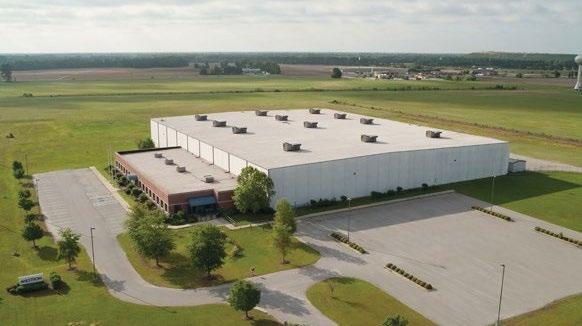
Operations are expected to be online by August 2023. Individuals interested in joining the EFP team should visit the company’s career’s page.
e Coordinating Council for Economic Development approved job development credits related to this project.
6 www.columbiabusinessreport.com January 2023
A Kershaw County plot has been designated a CSX Select Site by the Florida-based company. (Photo/Provided)
EFP LLC, or Engineered Foam Packaging, has leased property at 227 Browntown Road in Bishopville for its first facility in South Carolina. (Photo/Provided)
Ritedose to create 94 jobs with $81M expansion
By Christina Lee Knauss cknauss@scbiznews.com
The Ritedose Corp., a locally owned and operated pharmaceutical manufacturer, is investing $81 million to expand its facilities in northeast Columbia, a move expected to create 94 jobs.
Ritedose products include a wide assortment of respiratory medications as well as ophthalmic medicines used for eye care, according to CEO Jody Chastain, who said the expansion is largely motivated by an increased demand for the company’s products. He said the expansion will also allow more room for innovation and additional product development.
“ is is very exciting not only for me but the whole team,” Chastain told SC Biz News. “Our employees are very proud of what we do because we are very patient-focused, and we know the product we are making today could be used by our own family members tomorrow. is new project shows the employees we are willing to invest in the future of high-tech manufacturing.”
e rst phase of expansion has already begun and will include adding square footage to the company’s existing 273,000-square-foot facility in the Carolina Research Park. ere will also be internal renovations to the existing structure.
Chastain said the rst phase of the expansion should be completed by early
2024 and add about 50 jobs, with the rest added during the second phase of the project.
When complete, estimates say the addition will allow the company to manufacture an additional 400 million doses of pharmaceuticals, according to the release.
Founded in 1995, Ritedose operates a state-of-the-art “blow- ll-seal” facility where liquid pharmaceuticals are formulated, lled and packaged for distribution.
e company specializes in the aseptic production of sterile, single-dose medication and serves the contract development, manufacturing, generics and 503B outsourcing markets, according to a news release. eir main customers range from

small startups and retail pharmacies to large pharmaceutical companies, wholesales and hospital systems.
e Coordinating Council for Economic Development approved job development credits for the project, and also awarded a $500,000 Set-Aside grant to Richland County to help with the costs of building improvements.
 By Christina Lee Knauss cknauss@scbiznews.com
By Christina Lee Knauss cknauss@scbiznews.com
ANorth Carolina-based telecommunications company is expanding into the South Carolina market with a $100 million investment to bring high-speed fiber optic internet service to the greater Columbia area.
Lumos, based in High Point, N.C., announced they will be installing nearly 1,200 miles of ber optic technology in


Richland and Lexington counties, according to a news release.
Lumos currently provides ber optic internet, home wi- , voice and streaming services to more than 200,000 homes and businesses in North Carolina and Virginia. With this expansion, Lumos will reach under-served portions of Columbia, Forest Acres and Arcadia Lakes in Richland County, as well as West Columbia, Lexington, Cayce, Irmo and Springdale in Lexington County, according to the release.
“ e world is more connected than ever, and communities need high speeds to keep pace,” said Lumos CEO Brian Stading. “Lumos aims to unlock the potential of the digital world by providing ber optic internet to previously underserved areas across South Carolina.”
Community leaders are enthusiastic about the increased availability of highspeed ber optic internet in the area.
“High-speed internet access for all our residents is a priority for the Rich-

e Ritedose Corporation’s expansion is a major win for Richland County,” said Richland County Council Chairman Overture Walker. “Council sees the company’s continued investment in its facility here as an investment in our community, and we are excited about this project bringing many well-paying jobs to Richland County.”
“

land County Council and sta , and we are thrilled about this investment by Lumos in our community,” said Richland County Council Chairman Overture Walker. “ is partnership will catapult us across the digital divide and keep us competitive in terms of economic development.”
Engineering for the project is slated to begin by mid-year, with construction to begin shortly a erward, company o cials said. Residents will receive communications by mail when work begins.
January 2023 www.columbiabusinessreport.com 7 January 2023 (888) 845-6887 | Sales@DoctorsCare.com Employers.DoctorsCare.com Jonathan Pent Business Developer (803) 726-0477 Protecting your most valuable resources. | On-site rapid COVID-19 testing | On-site biometrics and flu shots Call today to inquire about on-site wellness solutions. 54 Locations in South Carolina for Occ Med Services Doctors Care Employer Health Services | DOT Physicals | Drug Screens | Injury Care | Workers’ Compensation | Occupational Medicine | On-site Medical Centers
be online interested visit the for Ecoapproved job develproject.
firm to invest $100M in
Tech
greater Columbia infrastructure project
What a slumping sterling means for SC’s economy
By Molly Hulsey Contributing Writer
On Dec. 2, the British pound climbed above $1.22 for the first time since June.
e boost may not mark the end of de ationary woes for South Carolina’s h largest export market, but experts believe the Palmetto State can milk some bene t from the slumped sterling.
And not just through cheaper holidays across the pond that usher $149 million into the nation each year from South Carolina.
“When we’re talking about the pound depreciating, that essentially means that manufactured goods in the United States and in South Carolina in particular become more expensive from the perspective of foreign buyers,” Joey Von Nessen, research economist with the University of South Carolina’s Darla Moore School of Business, told SC Biz News. “And in South Carolina, we export a majority of the goods that are manufactured here. And so, manufacturers are very sensitive to changes in the appreci-
ation or depreciation of the U.S. dollar.”
A de ated pound means an in ated dollar, which spells some challenges for the state’s $1.2 billion automotive, $517 million aerospace and $85 million management and consulting services market to the United Kingdom, according to a 2021 U.K. Department for International Trade analysis.

“It has a very practical consequence for manufacturers in South Carolina,” Von Nessen added. According to the U.K. Department for International Trade, more than 13,030 S.C. jobs are supported by exports to the United Kingdom.
Great Britain competes against China, Germany, South Korea and Canada as one of the top importers of BMW vehicles from Plant Spartanburg, making up 5.4% of all export volume in 2022, according to the company.
Despite a 4% year-over-year increase of Volvo sales in the U.K. in 2021, S60 sales from Ridgeville have dwindled over the past year, prompting the company to take the sedan o the British market, according to industry publication Autocar.
“ is continues to be a challenging time for the automotive industry, but these excellent results demonstrate how the strength of our products and the way we are adapting our business are inspiring customer condence,” Matt Galvin, U.K. commercial operations director for Volvo, said in a sales report last January.
Car Sales Base numbers show a halt of all S60 sales in Europe this February a er sales dropped by 2,679 between 2020 and 2021.
But while S60 production waned, Volvo’s S.C. facility ramped up to launch the fully electric EX90 in November, supported by a $50.6 million investment in Upstate suppliers, as well as the Polestar 3 SUV in 2024, according to previous reports.
Too soon to tell
Von Nessen underscored that it’s too early to know whether the plummeted pound could prompt British customers to shi away from U.S. goods to those made in-country: for example, purchases from Airbus, a U.K.-based brand, in lieu of Boeing.
“Especially right now, it’s unlikely that these types of currency uctuations are
going to have a major impact on the long run strategies of investment decisions by businesses,” he said. “And one of these reasons is that the Federal Reserve has been very aggressive in the U.S. throughout 2022, raising interest rates in order to combat in ation.”
When the Federal Reserve raises interest rates, the value of the dollar goes up in contrast to other global currencies.
“So, part of what we’re seeing is a result of the Federal Reserve trying to get in ation down,” he said. “And that’s more of a shortrun phenomenon as opposed to something that’s going to happen over the next several years.”
Not all is Scotched
e depreciated pound could make U.K. foreign direct investment in South Carolina less likely, according to Mike Graney, Charleston Regional Development Alliance’s vice president of global business development.
e United Kingdom sources 6% of all FDI in the Palmetto State, according to the
8 www.columbiabusinessreport.com January 2023
See SC’S ECONOMY, Page 9
A scotch distiller and numerous life science firms and distribution companies from the United Kingdom have expressed interest in settling in the Lowcountry. (Photo/Provided)
the long decisions by these reahas been throughout 2022, combat raises interest up in conis a result in ation of a shortsomething next several make U.K. South CaroMike Graney, Development Allibusiness 6% of all according to the
United Kingdom, South Carolina strengthen trade ties
By Christina Lee Knauss cknauss@scbiznews.com
South Carolina has a historic connection to the United Kingdom dating back hundreds of years, but not many people might be aware of the strong connection the two currently have when it comes to trade.

ink of international trade and South Carolina, and obvious countries like China come to mind, as well as nations like Germany because of the large presence of BMW in the Upstate.
However, on an annual basis the U.K. and the state engage in $1.95 billion worth of trade, and a recent visit from Greg Hands, the U.K.’s minister of state for trade policy, aims to make that number even larger.
Hands recently was in Columbia to meet with Gov. Henry McMaster, who signed a Memorandum of Understanding to boost trade and investment between the state and the U.K. It was the U.K.’s third state-level MoU, following the signatures of Indiana and North Carolina in 2022.

It's all part of what Hands described as a “twin-track” approach by the U.K. to increase U.S. trade on two levels – by engaging with individual states as well as the federal government.
In the future, U.K. o cials also hope to engage with Oregon, Texas, Oklahoma and Washington for further agreements.
“An MoU is all about agreeing to cooperate and work in areas of mutual interest
when it comes to trade,” Hands told SC Biz News. “It’s a very short, business-like document compared to something like a free trade agreement which might be a thousand pages. is document goes into detail on ways we will cooperate to grow trade, with focus particularly in two areas, the automotive industry and life sciences, which are big sectors both for the U.K. and for South Carolina.”
Increased worldwide demand for elec-
tric vehicles has led the U.K. to become one of the world leaders in the industry, and recent dramatic growth in the EV sector in South Carolina makes this an opportune time to enhance trade, Hands said.
“South Carolina is considered one of the automotive hot spots of the U.S. and we want to get a piece of the action,” he said. “We want to look at how we can get the U.K.’s EV sector thinking about South Carolina as a good place for growth and
investment.”
Hands also noted life sciences, which is the fastest growing industry sector in the state. e industry is also booming in the U.K., especially in Scotland and Wales, making it another area ripe for trade growth, including boosting export opportunities. e MoU also focuses on building research and academic partnerships
e MoU has the support of Sigmatex, a British carbon ber manufacturer whose North American headquarters is located in Cameron in Orangeburg County.
“As a UK company, we chose South Carolina as our preferred base in North America due to the many bene ts o ered by the state including a strong labor pool, a fast-growing industrial sector and a business-friendly regulatory environment,” said Paul McMullan, CEO of Sigmatex. “ e news of South Carolina and the U.K. agreeing on an MoU is very welcome indeed and sure to bring further bene ts to companies like Sigmatex.”
Hands said the goal is to eventually grow the MoU with South Carolina to focus on a wider array of industries including green energy, professional services and others.
“ ere’s a lot of strong economic growth in the Southeast and South Carolina is one of the leaders,” Hands said. “ e state overall has a good outward-looking view on growth from the governor’s mansion to the business leaders. We’re very interested in the growth you’ve got going on and we want to be a big part of it going forward.”
U.S. Department of Commerce.
However, other factors are at play.
Given increased power bills and other operating costs, as well as nancial instability brought on by Brexit, more British companies are eying opportunities on South Carolina soil, he said — if they can a ord to take the initial plunge.
“We’ve been watching this, because as the U.K. becomes a less desirable — and I mean that nancially, not politically — trade partner … because you’ve got these tari s, you’ve got these port hang-ups that you didn’t have before, the U.S. is relatively more attractive,” Graney said.
Graney’s team has elded continued interest from British companies over the past year, especially in distribution and the life sciences. Close to six U.K.-based companies, including a Scotch whisky distillery, reached out to the Charleston Regional Development Agency over the week of Dec. 2 with queries about locating in the Lowcountry.
“Generally, uctuations in currency exchange make an impact,” he said. “ ere’s no doubt about it, but the biggest driver for the U.K., the EU countries and also the rest of the world for the U.K., is the market. For instance, this liquor company today said,
‘the U.S. is the biggest market in the world, sooner or later, we need to be there.’”
Stephanie Yarbrough, a Charleston-based partner with Womble Bond Dickinson, said she hasn’t seen a slowdown in either South Carolina’s exports to Great Britain or international interest in locating within the state.
“I think the U.S. is really bene ting from the challenges in the global supply chain over the last few years,” said Yarbrough. “A lot of companies are saying so many of our
goods are sold in the U.S., so we just need to be there, and then we don’t have to rely on di culties with getting product and inventory and parts from all over the world if we are in the ultimate destination where goods are going to be sold or manufactured in the U.S. at just makes a lot of sense.”
Yarbrough, former economic development director for the city of Charleston, advises and represents companies from around the globe seeking to expand or move to the Carolinas.
Every day, she talks with her British colleagues about the economic challenges they’re facing, as well as U.K. companies hoping to compare notes on how the United States supports its companies and international trade, whether through traditional economic development incentives or foreign trade zones.
“Which I think is exciting because it does give a moment to say, ‘What are the lessons, if any, that we can learn from each other?’” Yarbrough said.
January 2023 www.columbiabusinessreport.com 9 January 2023
Greg Hands, minister of state for trade policy of the United Kingdom, and Gov. Henry McMaster recently met to sign a Memorandum of Understanding to enhance trade. (Photo/Provided)
SC’S ECONOMY, from Page 8
A scotch distiller and numerous life science firms and distribution companies from the UK have expressed interest in settling in the Lowcountry. (Photo/Provided)
Columbia-based Nexsen Pruet merges with Alabama firm, rebrands
By Jason Thomas jthomas@scbiznews.com
Alabama-based Maynard Cooper & Gale and Carolinas-based Nexsen Pruet have agreed to merge into one national law firm operating under the name Maynard Nexsen effective April 1, 2023.
As a combined firm, Maynard Nexsen will join together more than 550 lawyers operating out of 23 offices coast to coast in the United States, a release from Maynard Cooper & Gale stated. The merger combines two client-centered firms that will focus on further expansion in high-growth, high-opportunity markets, bolstered by the increased depth and breadth of client service offerings.
Maynard Nexsen will implement a shared leadership team, bringing together decision-makers who have
successfully steered both law firms for many years, the release stated. Jeff Grantham, managing shareholder of Maynard Cooper & Gale, will serve as CEO, and managing shareholder of the combined firm. Leighton Lord, Chairman of Nexsen Pruet, will serve as President and chief strategy officer, the release stated. Greg Curran, chairman of Maynard, will serve as chairman of the board and head of client relations for the combined law firm.
“Maynard Nexsen is a merger of two thriving firms that share the same culture, vision, and commitment to excellence,” Grantham said in the release. “With deep relationships and decades of experience in our respective markets, the firms fit together in a way that positions Maynard Nexsen for accelerated growth and collective success.
“Our newly combined firm will build on our common culture of client-centered service, collaborative teamwork, and entrepreneurial spirit. At over 550 attorneys strong, Maynard Nexsen will elevate our service and value proposition for our clients through greater capabilities, expanded geographical reach, and deeper bench strength that will allow us to handle any matter.”
“This is an incredibly exciting new chapter of growth as we come together as one,” Lord said in the release. “Maynard Nexsen is the result of two firms that share a client-centered culture and commitment to continued growth and evolution. Together, we are a powerful national force – broadening our capabilities and services to clients. I am honored to work together with Jeff Grantham and unite our talented teams.”
Maynard Nexsen will have 23 offices in the following markets:
Alabama: Birmingham, Huntsville, Mobile, Montgomery
California: Los Angeles, San Francisco
Florida: Miami, Orlando Georgia: Atlanta Iowa: Des Moines
New York: New York City
North Carolina: Charlotte, Greensboro, Raleigh
South Carolina: Charleston, Columbia, Greenville, Hilton Head/Bluffton, Myrtle Beach
Tennessee: Nashville Texas: Austin, Dallas Washington, D.C.
In addition to legal services, Maynard Nexsen will continue to own and operate the wholly-owned subsidiaries of Nexsen Pruet.
Columbia, Greenville commercial real estate firms merge
By Christina Lee Knauss cknauss@scbiznews.com
Commercial real estate firms NAI Earle Furman in Greenville and NAI Columbia have merged, a final step in a four-year process among eight local Columbia partners and NAI Earle Furman.

“We are excited that NAI Columbia is o cially rolling into our business family,” Jon Good, CEO of NAI Earle Furman said in a news release. “ is collaboration will mutually bene t both of our rms with more manpower, added support and additional resources. Together we will be able to better serve our clients throughout South Carolina and beyond.”
NAI Columbia joins NAI Piedmont Triad, a rm based in Greensboro, N.C., which merged with NAI Earle Furman in 2017.
“We began this partnership four years ago with a plan to ultimately merge the companies,” said Patrick Chambers, principal at NAI Columbia. “NAI Earle Furman has an infectious entrepreneurial spirit and culture that will maximize growth for our shareholders and employees. We could not be happier about what the future holds for our new combined company.”
NAI Columbia was established from a joint venture with NAI Earle Furman along with eight principals that had served as senior brokers with NAI Avant, according to the release. NAI Avant was derived from national real estate developer Edens & Avant, founded in Columbia in 1966. NAI Avant continued serving the Midlands until its sunsetting and reformation as NAI Columbia under new leadership and a new company structure.
10 www.columbiabusinessreport.com January 2023
The NAI Earle Furman staff in Greenville worked closely with the Columbia office for years before the official merger. (Photo/Provided)
the thing slopes upward. But then the Fed comes along and they start raising rates up, up, up, up, up, go short rates. Eventually short rates get to be higher than long rates and now the curve shows slopes downward. at’s known as an inverted yield curve.”
Slifer said that an inverted yield curve is typically a sign that Fed policy has become “too tight.” He said historically, going back about 50 years, when economists detect an inverted yield curve, a recession is about one year away.
“So both of my warning signals are telling me that something is going to happen by the middle of next year, so for that reason I’m looking for a recession in the rst half of 2024,” Slifer said, adding, “No recession for now, but I think it’s inevitable.”
In a year that saw continually rising interest rates, in ation, a battered stock market and late-year massive layo s, particularly in the tech sector, Slifer’s annual economic forecast sold out.

With several questions coming about federal policy, student loan forgiveness and the status of entitlements such as Medicare, Medicaid, Social Security, federal pensions, including veterans’ bene ts, he said the U.S. needs to do better with its monetary policy, including nding the political will to deal with looming insolvency issues with some of those programs. He said the Obama Administration had a possible plan in hand that
could have tackled these issues but decided against going forward. He said given the division in Washington, it’s unlikely any lawmakers would have the will to take on such thorny, di cult and costly issues.
Slifer said the status of the economy, with ever rising in ation but not a residual reduction in spending, can be found in the data and monetary policy decisions. Because in ation is tied to the real funds rate as an indicator of a recession, understanding how to navigate and mitigate that could become critical to emerging from an economic downturn.
“ e last couple of years, I think that scal and monetary policy that we’ve got in this country has gone seriously o track,” Slifer said.
He said our current monetary issues can be traced back to a government overreaction beginning in March and April 2020 with shutdowns related to the COVID-19 pandemic and gross domestic product dropping 30% for the quarter.
“In dollar terms, that’s about $2.1 trillion, right? And yet it wasn’t consumers, it wasn’t businesspeople that did any of that. is was on the government. ey did it,” Slifer said, referring to the shutdowns. “I think they felt a responsibility to make people whole.”
Slifer said that the rst stimulus of $2 trillion might have made sense, but the money kept coming with stimulus payments coming to businesses and individuals, in addition to the federal government buying debt.
By the time the stimulus packages had
ended, the $2 trillion in economic aid had nearly quintupled. He said a lot of people likely paid down debt, giving them the ability to spend more now, which has resulted in a strong economy even with rising in ation based on consumer spending and a willingness to go into debt.
“Add it all up, we had $9.5 trillion worth of stimulus for Pete’s Sake,” Slifer said. “We were trying to solve a $2 trillion problem. at just seems like gross overkill to me, and we’re sitting here wondering … ‘I wonder why in ation is so high.’ Well, here’s a start.”
Slifer also said the Fed underestimated the depth and causes of in ation. He said when he was at the Federal Reserve, politics did not gure into Fed policy, and he’s reluctant to say that has been happening now. He said instead he wanted to think it was just a miscalculation based on circumstances that were di cult to predict.
Slifer said the Fed thought in ation initially was just temporary, and said in ation was simply a result of supply disruptions and other things that had taken place during the pandemic. He said they just expected in ation to go away.
“ ey stuck to that theme for a year and a half,” he said. “ ey didn’t give up until December of last year, and then they nally said, ‘Uh, oh, you know this in ation is just not as temporary as what we thought. We’ve got a problem here, and by the way, we’re way behind the curve and we’re going to start raising rates.’ e Fed, in my view, was about 18 months too late.
at’s a long time.”
Being slow to react to in ation and an overreaction with stimulus payments going through March 2021, even though the pandemic recession ended in April 2020, has had a ripple e ect that impacts in ation, scal policy, real estate and investments along with di culties in the labor market, Slifer said.

“It absolutely was totally unnecessary in my view,” Slifer said. “ ere are consequences to that stu . at’s why we’re sitting here looking at these really high in ation rates, interest rates have risen dramatically, (and) government debt has exploded.”



One audience member asked if the Charleston area might be somewhat “insulated” from the recession he predicts a year from now considering that the region typically does not to fall as far and bounces back faster than other areas during economic downturns.
Slifer said with the strength of the housing market at di erent price points and the demographics of the many people who continue to move into the market, he does not expect to see the decline in housing, GDP, and the labor markets that other areas might experience. But he said while there might be a diminished impact for the Charleston region, he said he would not use the word “insulated.”
“Are we going to be insulated and not see (home) prices drop? I don’t think so,” he said, adding, “We are not insulated. We’re going to move in the same direction, but I guess with a lesser degree.”
January 2023 www.columbiabusinessreport.com 11 January 2023
ECONOMIC, from Page 1 REVVING UP: SC Automotive Industry In the March/April issue, hop into the driver’s seat as SCBIZ Magazine explores South Carolina’s fast-paced automotive industry and how the Palmetto State is quickly becoming the “Battery Belt” for attracting electric vehicle manufacturing operations. Charleston County will be in the Spotlight, along with a Power List of Information Technology and lists of IT services and networking, and largest employers. Don’t miss this opportunity to promote your brand to 80,000+ high-level business executives and site selectors. • Upfront • SC Delivers - Port Impact • The South Carolina You Don’t Know • County Spotlight: Charleston • Power List: Information Technology DEPARTMENTS SPECIAL SECTIONS For more information, contact Ryan Downing at rdowning@scbiznews.com COMING IN MARCH!
FORECASTING THE YEAR AHEAD
Former Lehman Brothers economist takes a look at 2023
 By Stephen Slifer Contributing Writer
By Stephen Slifer Contributing Writer
Arecession is coming sometime in 2023 or 2024. We do not expect it to arrive until the first half of 2024. Why so late? Several reasons.
First, the real funds rate is likely to remain negative until the middle of 2023 which means it will have little bite and not slow the economy much until that time. Second, the economy is still producing more than 200,000 jobs per month which is keeping the unemployment rate near a 50-year low.
Third, despite a precipitous decline in sentiment, consumer spending continues to climb at a moderate rate.
Fourth, the housing market has taken the brunt of the Fed’s tightening but with home prices now declining the housing market should soon stabilize and sales should begin to climb somewhat in 2023. At the same time, with rents rising at a 7.0% pace, wages climbing rapidly as workers try to counter falling real earnings, and oil prices likely to climb somewhat as the drawdown of oil from the Strategic Petroleum Reserve comes to a halt, inflation will only slow gradually in 2023. To encourage slower growth the Fed will raise the funds rate from 4.4% currently to 6.0% by the middle of the year. That will (finally) raise the real funds rate into positive territory and produce enough of a drag on growth to trigger a mild recession in the first half of 2024. Once the recession arrives and inflation begins a rapid descent, the Fed will allow the funds rate to decline quickly in the spring of that year.
STEPHEN SLIFER
the economy enough to bring inflation back under control. For that reason we believe the Fed will raise the funds rate to 6.0% by mid-2023. At that time inflation will have slowed somewhat to 4.6% so the real funds rate will have become positive at +1.4%, which may be enough to induce a mild recession in early 2024.
Jobs growth. Given the extent of Fed tightening in 2022 one might have thought that jobs would be declining. Not even close. In the most recent 3-month period the economy has generated 270,000 jobs per month. Earlier this year the economy was producing 600,000 jobs per month so jobs growth has slowed from on fire to merely hot. Firms are still struggling to find enough bodies to fill open positions.
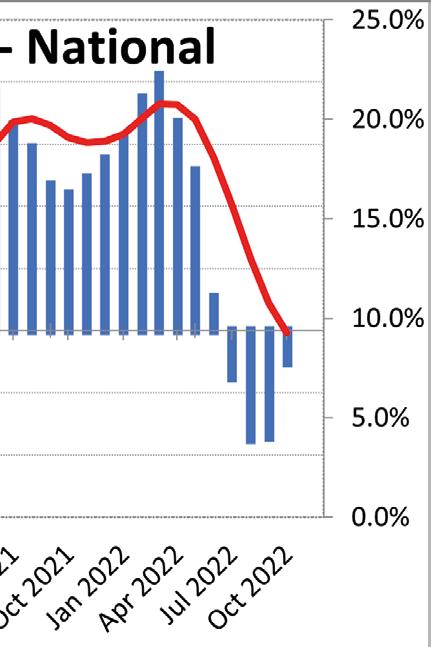
sures will diminish and the inflation rate will subside.
Consumer sentiment and spending. Consumer sentiment has plunged since the beginning of last year as the fear of higher inflation and higher interest rates has spooked consumers. Sentiment is on a par with where it was in the so-called “Great Recession” of 2008-09.
spending consumers have run up their credit card debt. That is not sustainable over the long haul, but it is manageable for some time to come simply because consumers had so little debt at the beginning of last year. Consumer spending will eventually slow, but it has not yet done so.
The real funds rate. The Federal Reserve boosted the funds rate from 0% at the end of 2021 to 4.4% at the end of this year. That is a lightning fast pace of tightening, but still leaves the real funds rate in negative territory. With the funds rate at 4.4% and the core CPI at 5.8% at yearend, the real funds rate remains negative at -1.4%. Going back to 1960 the U.S. economy has never gone into recession until the real funds rate was positive. For example, it was +3.0% prior to the 2008-09 recession, and an astonishing +8.0% in the 197980 period when the double-digit inflation rate was well entrenched. The current -1.4% funds rate will not slow
Because the labor force has been growing more slowly than jobs, the unemployment rate fell 0.4% in 2022 to 3.5%. The Fed believes the economy is at “full employment” when the unemployment rate is 4.0%, at which point anybody who wants a job has one. The labor market is still extremely tight. To have any meaningful chance of raising the unemployment rate and thereby reducing wage pressures, the Fed needs to create some additional unemployed workers by inducing a mild recession. A 6.0% funds rate and a +1.4% real funds rate by the middle of 2023 may be enough to make that happen. Once that occurs wage pres-
Given the degree of consumer angst, one might have thought that consumer spending would plunge. It has not. In fact, real consumer spending has risen 2.0% in the past year. Compare that to the precipitous drop in spending in 2020. Why haven’t consumers cut spending? First, they do not seem to have any fear of losing their job. The unemployment rate is 3.5% which is below the full employment level of the unemployment rate which is 4.0%. In the midst of the 2008-09 recession the unemployment rate was hovering at around 10.0%. Without the fear of losing their job, consumers have little incentive to cut spending.
Second, it appears that a portion of the proceeds from the stimulus checks distributed in 2020 and 2021 were used to pay down debt. The total monthly payments on a consumer’s rent or mortgage, auto loans, car loans, credit cards and student loans as a percent of income is far lower now than it was prior to the 2008-09 recession.
To maintain a moderate 2.0% pace of
The housing market. The housing market has taken the brunt of the Fed’s tightening initiative as home sales have plunged since the beginning of the year.
The catalyst for the drop in sales was a dramatic increase in mortgage rates which climbed from 3.0% at the end of 2021 to the 7.0% mark before recently retreating to 6.4%. If the Fed raises the funds rate to 6.0% by midyear mortgage rates may once again climb to 7.0%, but a further increase of 0.6% in mortgage rates pales in comparison to the 3.3% increase in 2002.
More important is the fact that home prices are beginning to fall quickly. After consistently rising by 1.0-1.5% per month for two years, the rapid decline in sales is causing prices to fall by 0.5-1.0% per month and they should continue to decline steadily throughout 2023.
Combining a modest increase in mortgage rates with a sizable decline in home prices, housing affordability should climb in 2023. That will likely boost home sales slightly by the spring. That is in sharp contrast to the 35% drop in sales in 2022.

12 www.columbiabusinessreport.com January 2023
A rapid decline in home sales is causing prices to fall by 0.5-1.0% per month and they should continue to decline steadily throughout 2023. (Image/Stephen Slifer)
GDP growth. Pulling all of this together we look forward to 2.0% GDP growth rate in the fourth quarter of this year, followed by 1.0% growth in 2023 which is somewhat faster than the 0.5% pace envisioned by the Fed. If the Fed boosts the funds rate to 6.0% by June and the real rate reaches +1.4%, that should be sufficient to produce a mild two-quarter recession in the first half of 2024, followed by a recovery in the second half of that year.
Inflation. We anticipate a slow path back to the 2.0% inflation target for several reasons. First, rents continue to climb. In the past 12 months the shelter component of the CPI has risen 7.1%, and it is unlikely that it has reached its peak. Given that this category represents one-third of the entire CPI index, it is difficult to imagine how inflation can quickly shrink when onethird of the entire index is rising at a 7.0% pace. Because the rent component of the CPI lags the change in home prices by about a year, rents may not begin to decline until the fall of 2023.
Second, the continuing tightness in the labor market is causing firms to bid up wages in an effort to steal workers from someone else. As a result, average hourly earnings have risen 4.6% in the past year. But because inflation has risen even faster, real wages have fallen by 2.1%. Whenever real wages decline there is an incentive for individual workers and unions to seek even bigger wage gains. The recently averted strike amongst rail workers was all about higher wages. Airline pilots for United and American Airlines settled for roughly a 20% wage gain spread over two years. Other unions will follow suit. Given that wages represent about two-thirds of a firms total costs, higher wages are bound to translate into higher prices and faster inflation.

Third, gasoline and crude oil prices have fallen sharply since March when President Biden chose to tap the Strategic Petroleum Reserve for 1 million barrels of crude oil every day for six months. But that drawdown is complete and 1 million barrels of oil per day are now off the market. The reduced supply could be offset by faster production. However, the EIA expects oil production to rise only slightly from 12.1 mbpd currently to 12.3 mbpd by the end of 2023. The 0.2 mbpd increase in production will not come close to offsetting the 1.0 mbpd drop in supply. That should translate into higher energy prices in 2023 which is in sharp contrast to the $35 drop in oil prices since March of this year.
Given all of these factors we envision a slow drop in the core CPI inflation rate from 5.8% this year to 4.3% by the end of 2023. Unfortunately, that is still double the Fed’s targeted rate of inflation of 2.0%. With the inflation rate still that high, the Fed cannot back away from the additional rate hikes that are required to bring inflation back to

target.
Given GDP growth of 3.2% in the third quarter and a likely 2.0% increase in the fourth quarter, the economy still has considerable momentum. For that reason we expect the Fed to raise the funds rate to 6.0% by mid-2023 which would finally create a positive real funds rate of 1.4%. That should be high enough to produce a mild recession in the first two quarters of 2024. That, in turn, will cause a more rapid slowdown in inflation to 2.5% by the end of 2024.

As the economy slips into recession and inflation approaches its target, the Fed will allow the funds rate to decline
quickly in the first few months of 2024. By year-end 2024 the funds rate will have dropped to 2.5% which the Fed believes is a “neutral” funds rate.
And, after rising to a peak of 4.6% during the recession, the unemployment rate will decline to 4.3% by the end of 2024 which is close to the full employment threshold of 4.0%.
All of the distortions created by COVID — the initial shutdown, the dramatic amount of fiscal and monetary stimulus, and the resulting supply chain difficulties may finally wash through the system by the end of 2024.
Unfortunately, the end of 2024 is
still two years down the road. It would be nice if the recession were to occur sooner because as long as the specter of a recession looms, it will be hard to generate robust GDP growth and equally difficult to reignite the stock market.
Stephen Slifer of Number Nomics is a resident of Daniel Island. From 1980 until his retirement in 2003, he was the chief economist for Lehman Brothers in New York City, directing the firm’s U.S. economics group and responsible for the firm’s forecasts and analysis of the U.S. economy
January 2023 www.columbiabusinessreport.com 13 January 2023
This graph shows the sudden drop at the outset and then rise and fall of home sales during the peak of the COVID-19 pandemic. (Image/Stephen Slifer)
Consumer sentiment has plunged since the beginning of last year as the fear of higher inflation and interest rates has spooked consumers. (Image/Stephen Slifer)
New monthly tool offers ‘barometer’
By Christina Lee Knauss cknauss@scbiznews.com
The S.C. Chamber of Commerce and Department of Employment and Workforce are launching a voluntary monthly survey called the Palmetto Business Barometer to better understand conditions the state’s employers are facing and inform the public about the state economy and workforce.
e survey measures business conditions and attitudes over time with an emphasis on workforce behaviors, according to a news release.
e S.C. Chamber will manage the
survey and DEW will analyze the data to identify how business conditions, needs and expectations are changing, the release said.
e aggregated collected data will be published online, but individual responses will remain con dential.
e rst round of the Palmetto Business Barometer survey went live on Monday, Jan. 9. Businesses will have two weeks to complete the brief 12-question survey before it closes on Sunday, Jan. 22. e survey will open again on Feb. 6 and will continue to open on the rst full week of each month throughout the year for each new survey round.
“ is survey is a great opportunity to hear directly from businesses on what challenges they are facing and what best practices work for them,” said DEW executive director Dan Ellzey. “By making the survey results public, we are helping employers compare notes as well as understand what others in the state are doing right that they can emulate and improve upon.”
e survey will help o cials with both organizations to track trends and “advocate for real solutions based o clear data,” according to Will Frierson, vice president of government a airs for the S.C. Chamber.
“From surveying our membership alone, we know South Carolina businesses are facing many obstacles from rising costs to workforce shortages,” Frierson said in the release. “With economic uncertainty looming, we need to know what businesses are facing on the frontlines and how conditions are changing for better or for worse.”
Businesses of all sizes and industries are encouraged to participate in the survey. Access the January Palmetto Business Barometer survey here. For more information, contact communications@ dew.sc.gov and payton.lang@scchamber. net.
Food waste upcycler investing $8M in Lee County plant
By Jason Thomas jthomas@scbiznews.com
Acompany that upcycles food waste products is establishing operations in Lee County. e Upcycle Co., a provider of services to upcycle fats, oils, proteins and nutrient-dense fertilizer from food processing plant waste, will open a facility in Bishopville, according to a news release from the South Carolina governor’s o ce. e company’s approximately $8 million investment will create 22 new jobs over the next ve years, the release stated.
Located at 261 Myers Lane in Bishopville, e Upcycle Co.’s Lee County facility is its rst South Carolina location, according to the release. e new facility is a partnership between e Upcycle Co. and Belger Farms, a family-run farm with a long history of utilizing organic residuals as a supplemental fertilizer.
Under the partnership, e Upcycle Co. is establishing a treatment facility at Belger Farms that will extract the oils from these residuals, yielding a valuable co-product with end-uses in the fertilizer, cosmetics, energy, animal feed industries and others, the release stated. e remain-
ing organic materials will provide an even higher quality supplemental fertilizer for use on this farm and others in the region.
“Lee County is proximate to many of the plants that generate the source materials that we can upcycle into a range of valuable co-products,” e Upcycle Co. CEO Dewey Burke said in the release. “Working with Belger Farms, Lee County and the state of South Carolina has made the establishment of our operations very easy, enabling us to bring the bene ts of upcycling at scale to the region.”
e Upcycle Co. serves the animal harvest, food production and further
processing industries that generate wastewater high in fats, oils and proteins, the release stated. e company’s advanced, patent-pending, proprietary fat and oil extraction technology e ciently separates the oils and protein solids, upcycling them into valuable co-products for benecial use.
Upcycling reduces the use of wastewater treatment chemicals, promotes sustainability and enables companies to enhance environmental practices to help meet environmental, social and governance commitments, the release stated.
Operations begin in a few weeks.
Thermoplastics company to invest $13 million in Kershaw County
By Christina Lee Knauss cknauss@scbiznews.com
Orion Performance Compounds Inc., a manufacturer of highly engineered thermoplastic compounds, will invest $13 million to establish operations in Kershaw County, creating up to 54 new jobs.
The company blends melted resins with carbon fiber, lubricants and other
additives to form custom materials for use in a wide variety of markets including automotive, medical, aerospace, according to a news release.
Orion’s new 50,000-square-foot manufacturing and distribution facility will be located at 15 Mesa Lane in the Heritage Pointe Industrial Park in Lugoff. Operations are expected to be online by the second quarter of 2023.
“The Lugoff site was selected after
an extensive multi-state search,” said Tom Drye, the company’s CEO. “The state of South Carolina and Kershaw County were very welcoming to our planned business and removed any hurdles along the way.”
The Coordinating Council for Economic Development approved job development credits for the project and also awarded a $300,000 set-aside grant to Kershaw County to assist with
the costs of building improvements, the release said.
“ is announcement provides a welcome economic boost and great addition to Kershaw County’s diverse and growing business sector,” said Kershaw County Council Chairman Julian Burns.
Those interested in joining the Orion Performance Compounds Inc. team should email resumes to the company.
Largest indoor pickleball facility in SC coming to Lexington
By Christina Lee Knauss cknauss@scbiznews.com
Fans of the fast-growing sport pickleball will soon have a new place to play in the Midlands. 24 Hour Pickleball recently purchased its first land site at 4590 Augusta Road in Lexington, which will be home to the largest indoor pickleball facility in South Carolina.
e 24 Hour Pickleball club will include 12 pickleball courts – eight
indoors and four outdoors. e indoor courts will be under a bubble dome air structure which will allow them to remain open in any weather and during all four seasons. e club will also have an outdoor social space for events and room for multiple food trucks, according to a news release.
24 Hour Pickleball is a pickleball training club for learning, playing and competing at all skill levels. Its mission is to provide coaches with the exibility and opportunity to set their own sched-
ule and to provide players the opportunity to learn the game of pickleball when it is most convenient for them.
“We are very excited to break ground on our rst site, right here in the Midlands of South Carolina,” said 24 Hour Pickleball’s project manager Mitch Craps. “Pickleball is the fastest growing sport in the country right now Our club will give members of our community the chance to learn, play, and compete in a climate controlled, state-of-the-art facility.”
Construction started this month and plans are to open the doors by June 2023. More sites around the state and the southeast are also in the works.
24 Hour Pickleball will be a members-only club and will host tournaments and league play throughout the year. e club will also have certi ed coaches available for training and learning the sport at all levels of play.
More sites throughout South Carolina and the southeast are already in the works and will be announced soon.
14 www.columbiabusinessreport.com January 2023
Lexington













NLRB ruling falls in favor of longshoremen’s union

to agree to amend the master contract to promise that they would not utilize any newly built marine terminals that did not hire master contract workers for all master
S.C. government o cials and employers traditionally have worked to keep union activity low in the state, which in fact has the lowest rate of union membership in the





















e ILA said it will continue to ght for union operators at the terminal if the USMX appeals. And S.C. Ports President
and CEO Barbara Melvin indicated that an appeal is indeed the next step.














“S.C. Ports Authority is disappointed in the split ruling of the NLRB, which overturned the September 2021 ruling by the administrative law judge that was in favor of S.C. Ports Authority,” Melvin said in a written statement. “We are still assessing the reasoning of the board panel’s opinion, but we intend to appeal to the federal court of appeals in line with the reasoning of the board’s dissenting opinion and the underlying initial ruling, which we believe is more
 The state ports have experienced continual growth over the last few years, operating with a mix of union and nonunion employees. (Photo/Kim McManus)
The state ports have experienced continual growth over the last few years, operating with a mix of union and nonunion employees. (Photo/Kim McManus)
CALLING ALL HIGH-GROWTH COMPANIES! For sponsorship information, contact Ryan Downing at rdowning@scbiznews.com. #R20SC Is your company one of the top high-growth companies in the state? Let’s find out! Winner rankings will be revealed during a fast-paced countdown celebration in Columbia. The top 20 small and top 20 large companies will be profiled in SCBIZ Magazine. Self-nominations are encouraged! Nominations close on March 27, 2023 at 5:00 p.m. Nominate today: bit.ly/scbizr20noms Hosted by: 2023 2023
In Focus
WORKFORCE/STAFFING
NEXT ISSUE’S FOCUS: Hospitality and Tourism
How staffing firm helps employers navigate post-COVID hiring SWIMMING IN THE LABOR POOL
By Krys Merryman kmerryman@scbiznews.com

With more people wanting to work from home post-pandemic, HTI Employment Solutions is a workplace staffing firm navigating their own staffing issues in addition to finding top talent for their clients.
Herb Dew, CEO and one of the firm’s founders, started HTI in 1999 in Greenwood with co-founders John Knight and David Sewell.

The company started as a white-collar headhunting group with a focus on manufacturing, Dew said, and now boasts locations in Oklahoma, Alabama, Mississippi, Tennessee, Georgia, North Carolina and Illinois in addition to South Carolina. Their clients include companies such as Bosch and Michelin.
HTI is headquartered in downtown Greenville and has been since 2001. The staffing company has grown from a boutique technical recruiting group to a company with several operating divisions: hiring placement, manufacturing project management, temporary staffing, human resources consulting, and workforce culture-building and talent development.
When the partners made the decision to move their headquarters to Greenville, it was during a time when the city was transitioning from a textile town to a city with a booming manufacturing base, in which they saw potential.
However, the COVID-19 pandemic changed the way they had to do things — along with the way they did business with their clients also struggling to hire and retain top talent.
Across HTI’s locations, they have experienced hundreds of job openings le un lled through the span of 2022.
“We are putting a lot more money into advertising and recruiters ourselves,” said Dew. “All locations are experiencing the same issues with high turnovers.”
Starting in 2019, the unemployment rate saw a drop, said Dew. If you look at the unemployment rate and it’s around 3%, about a third of them can’t pass a background check or a drug screen, which leaves a practical rates of 2%.
“Everyone is competing to try and hire within that 2% of those unemployed,” he added. “I would say the
LISTS: Professional Sta ing Firms, HR & Payroll, Page 18, 19
See HTI, Page 17
Herb Dew co-founded HTI in 1999 and has followed trends in staffing ever since. (Photo/Provided)
market is still really tough. Hourly pay rates (nationwide) have gone up around 25% over the last two years and white-collar salaries as well, but the labor competition, specifically in South Carolina, remains stiff.”
e last two years have been the most unusual Dew has ever seen in the job market, but in a way, he thinks it’s a good thing because it has challenged employers to be willing to change.
“We realized we were helping all these companies with their hiring and what we also needed to do was to help companies understand what they needed to do to be more attractive,” he said.
During the pandemic, all of sudden people were working from home, and it remains a common practice.
“Hybrid work is now the norm,” said Dew. “It’s not uncommon for workplaces to require maybe two days in the o ce and three days out of the o ce. But I don’t think companies were positioned on how to work through that.”
One of the changes HTI made as a result was to launch a new division — workplace strategies — to help companies retain their top talent.
“We still wanted to do our core work, which is to help people hire, but we also wanted to help them develop their strategy on how to keep those people, which in turn helps us hire better,” Dew added. “Our focus has shi ed from being a labor provider to being a strategic partner on what our strategy is for employee retention.”
Companies spend a lot of time on recruiting but sometimes don’t stop to
think much about rst impressions, said Dew. For example, the rst week an employee is on the job, how are they being handled and set up for success? Are supervisors also listening to their overall career goals?
“ is is really important in the hiring process, but most companies don’t do that,” said Dew. “Having this new division speaks to not just hiring 100 people but focusing on the best strategies to actually keep them.”
Dew’s company is working on a hybrid schedule for HTI employees as well. Each department head meets with their team and decides for themselves what is most e ective for their work schedules, Dew said. Some departments do require workers to be on-site every day but for others they can work remotely nearly 100% of the time.
“I think what COVID did was cause everybody to sort of rethink what they want out of work and what do they want out of their personal life,” he said. “I think it reset completely how we view work. And I think all companies are just trying to gure that out and adjust to it.”
One of the bene ts HTI added to their employee packages last year, Dew said, which has been successful, was a “wellness bene t.” ey gave every employee $500 to use at their discretion and two half days on top of their PTO to use as wellness days.
“I think pre-COVID that’s the sort of thing that would have been a bene t we would have never thought of,” Dew said. “But I think post-COVID, it has to do with work-life balance. I think balance is what younger employees
are looking for and want to feel connected to their employer and community, family, what they’re doing on the weekends. We also help other companies do packages like this as well.”
In addition to sta ng, another challenge HTI has faced over the last few years is people wanting more communication and professional development, which is why they added a $1,500 stipend to their bene t package for those employees wanting to take a class that would help them develop in their current roles.
Another challenge they are facing is simply that there are more jobs available than there are people to ll them, said Dew.
More than 4 million Americans decided to retire early, and then families with two incomes decided to go to one income post-COVID, according to Dew. In other cases people went back to school, cutting down the workforce signi cantly in a short amount of time.
In previous generations, such as Baby Boomers, it was normal practice to start a job and stay until retirement, said Dew. But people under 40 don’t think that way now.
“ ey want to be happy with their jobs and feel connected, they want to understand the mission of their company, they want to be developed, they want proper communication, and I think they have no problem looking elsewhere if their current company can’t provide those things,” said Dew. “So that leads to more exibility and mobility, and I don’t see that changing, so that’s a change companies have to adjust to. e companies that don’t
nd themselves adjusting to the wants of employees are going to not retain the people that help them grow.”
South Carolina technical schools are adjusting well to matching the skills employers need for future generations, Dew said.
“We also need to go into high schools and speak to more students,” he added. “ ere is a misconception that students need four-year degrees, but they can go to technical colleges if they like working with their hands and can make $35 an hour right out of the two-year program.”
Dew said the labor pool is getting a boost from an increase in people moving to South Carolina, but he thinks employers will continue seeing these challenges for a long time.
Also a member on the S.C. Chamber of Commerce board, Dew said their biggest topic of conversation has been workforce development, whether manufacturing, hospitals, banks — whatever industry, people are experiencing the same challenges with nding and retaining good talent.
“As companies, we need to create cultures in which people want to join the team and stay,” said Dew. “And then as a state, we have to train and educate the workforce to be ready or think about how we attract people to come to the state to work. In the sectors we support, most of them have felt short-handed, so they are having to pay overtime or have disruptions in business that are caused by labor shortages, which results in the loss of billions of dollars nationwide,” Dew said.
Task force wants nonworkers to dive back in
By Christina Lee Knauss cknauss@scbiznews.com
Aspecial state task force formed to figure out why South Carolina has such a low rate of labor force participation is considering the results of two surveys on the issue revealed in December.
The South Carolina Labor Force Participation Task Force was first convened in March 2022 and is made up of leaders from academic, research and business whose goal is to look at a wide variety of data and analyze the state’s labor market.
The goal is to find out why only 56.4% of eligible adults in the state were working or looking for work as of November, according to statistics compiled by the S.C. Department of Employment and Workforce. That is the fourth lowest figure in the country, compared with 62.1% nationally.
The first project, conducted by Millan Chicago LLC, surveyed individuals who had dropped out of the
unemployment insurance and wage records maintained by DEW during the pandemic. These were people who appeared in the data in 2019, filed for benefits in 2020 and were not present in the data in 2021. The study’s goal was to understand what had happened to the more than 150,000 people who fell into this category. The Task Force was interested in finding out how many of those people left the labor force, how many might be interested in returning, what barriers to employment they faced and what could motivate them to rejoin the state’s workforce. More than 6,000 people responded to the survey, according to a news release from DEW.
“ e survey was able to determine that 46% of respondents are working in some capacity, which makes sense since contractors and sole proprietors, among other types of work, aren’t included in our agency’s UI wage records,” said Bryan Grady, labor market information director for DEW and a task force member. “Another 26% said they were not interested in work due to being
retired, studying, caregiving or having health-related issues. at le 28% of respondents who are not working but indicated that they could be.”
Grady said the survey results indicated that the greatest barriers preventing people from rejoining the workforce are low-paying jobs, health and disability concerns, gaps in employment history and lack of reliable transportation and child care.
The second project, conducted by Chmura Economics and Analytics, was a broad-based analysis to identify the causes of the state’s low labor force participation rate.
“One of the primary takeaways from their report was how central South Carolina’s aging population is to this issue,” said Erica Von Nessen, a research economist for DEW and task force member. “Between 1994 and 2019, the share of our state’s population age 65 and older nearly doubled. This fact alone explains most of the decline in the state’s labor force participation rate in that time.”
Von Nessen said the Chmura study also identified other causes for people not working and incentives that could bring them back into the labor force, including ensuring that people with disabilities receive accommodations they need for gainful employment.
DEW Executive Director Dan Ellzey said the agency is constantly trying to increase outreach to those around the state who want to work but haven’t rejoined the labor force through services such as SC Works centers around the state.
“Professionals at these centers can help individuals network with employers, conduct skills assessments, assist with resume writing and interviews and even help them find childcare assistance or transportation,” Ellzey said in the release. “We can’t emphasize enough the importance of knowledge and accessibility when it comes to the job market.”
Public briefings on the studies’ results will be held in the next few months.
www.columbiabusinessreport.com 17 January 2023 IN FOCUS: WORKFORCE/STAFFING
HTI, from Page 16
Professional Staffing Agencies
Ranked by No. of In-House Emplo yees in the Columbia Area
Company
Systemtec Inc. 200 Center Point Circle, Suite 301 Columbia, SC 29210
TM Floyd & Co.
1301 Ger vais St., Suite 1700 Columbia, SC 29201
Recruiting Solutions
1441 Main St., Suite 890 Columbia, SC 29201
EmployBridge / Hire Dynamics 2337 Augusta Road Columbia, SC 29169
Roper Staffing 125 Outlet Pointe Blvd. Columbia, SC 29210
AppleOne Employment Ser vices
1021 Pinnacle Point Drive, Suite 050 Columbia, SC 29223
Find Great People LLC 190 Knox Abbott Drive, Suite 3B Cayce, SC 29033
Gallman Personnel Ser vices Inc. 1360 Browning Road Columbia, SC 29210
DP Professionals Inc. 3741 Landmark Drive, Suite 200 Columbia, SC 29204
Condustrial Staffing 1907 Sunset Blvd. West Columbia, SC 29169
Kudzu Staffing / Kudzu Medical 120 Brookside Parkway, Suite A Lexington, SC 29072
Spherion Staffing
4727 Sunset Blvd., Suite D Lexington, SC 29072
Carolina Industrial Staffing Inc. 810 Dutch Square Blvd., Suite 195 Columbia, SC 29210
Globalpundits Technology Consultancy Inc. 4715 Sunset Blvd., Suite D Lexington, SC 29072
Jerman Personnel Ser vices Inc. 455 St. Andrews Road, Suite C4 Columbia, SC 29210
Marathon Staffing 1314 Lincoln St., Suite 306 Columbia, SC 29201
Phone / Website / Email
803-806-8100 www.systemtec.net info@systemtec.net
803-765-1310 www.tmfloyd.com info@tmfloyd.com
803-806-8125 www.recruitingsolutionsonline.com apply@recruitingsolutionsonline.com
803-939-5888 www.employbridge.com stephanie.barone@employbridge.com
803-798-8500 www.roperstaffing.com information@roperstaffing.com
803-699-9941 www.appleone.com jspeight@appleone.com
803-783-3636 www.fgp.com info@fgp.com
803-750-4878 www.gpsjobs.net gpscorporate@gpsjobs.net
803-738-0066 www.dppit.com info@dppit.com
803-454-0340 www.condustrial.com info@condustrial.com
803-217-3320 www.kudzustaffing.com info@kudzustaffing.com
803-772-4928 www.spherion.com georgiameeks@spherion.com
803-798-2045 www.carolinaindustrialstaffing.com kchapman@carolinaindustrialstaffing.com
803-354-9400 www.globalpundits.com gp@globalpundits.com
803-798-0556 www.jermanpersonnel.com work@jermanpersonnel.com
803-753-1771 www.marathonstaffing.com columbia@marathonstaffing.com
Top
Paul Elias Laura L. Hoge Steve R. Br yant 1998 150 150 3% 2% 88% 2% 5%
John Starmack, Henr y Barnett, Tracey Worthey 1976 145 145 5% - 75% 10% 10%
Cam Varner, Trey Smoak, Drew Williams 1992 50 1,625 10% 60% 13% 12% 5%
Kim Wallace, Stephanie Barone 1985 44 - - 20% - - -
Billie Dekle 1982 26 1,140 10% 20% - - 5%
Jan Speight, Erin Vassallo, Jessica Elkins 1964 23 1,200 20% 30% 5% 30% 15%
John Uprichard, Megan Graham, Betsy Anthony 1982 21 72 18% 27% 20% 3% 4%
Nanci Fields MJ Sorrell R. Smith Richardson 1985 21 171 6% 10% 1% 3% 10%
Barbara Blau, Chris Dickenson 1996 18 78 - - 100% - -
Lane Flinn 2002 8 - - 15% - - 5%
Chris Hall 2006 8 200 1% 4% - 50% -
Georgia Meeks 1946 8 400 25% 26% - 4% 5%
Kodie M. Chapman 2014 6 - 5% 20 % - 20% 5%
Joe Doyle 2000 6 - 5% 10% 70% 5% 5%
Travis Cashion 1988 5 90 10% 50% - - 8%
Kelly Breen 1987 5 80 5% 5% - - 10%
803-470-2006 www.kgworkforcesolutions.com info@kgworkforcesolutions.com Kelli Morris Long 2016
Staffing Ser vices of the Midlands 114 Haygood Ave. Lexington, SC 29072 803-359-7644 www.snelling.com/midlands snelling@snellingmidlands.com Elizabeth Trenbeath 1982
Staffing Inc. 110 Rodriguez Road Orangeburg, SC 29115 803-516-9433
10
18 www.columbiabusinessreport.com January 2023 IN FOCUS: WORKFORCE/STAFFING
Local Official(s) / Year Founded In-House Employees Avg. Weekly Workers Accounting / Financial Admin. / Clerical IT / T echnical Medical / Health Care Mgmt. / Executive Level
4
KG Workforce Solutions 141 Riverchase Way Lexington, SC 29072 20% 15% 40% 5%
20%
4
8% 40% 2%
Snelling
200
2% 8%
www.alternativestaffing.com recruiting@alternativestaffing.com Ruby Wallace 1993 2 50 - 20% - -Gallman Consulting, division of Gallman Personnel Ser vices Inc. 1360 Browning Road Columbia, SC 29210 803-744-3304 www.gallman-consulting.com gallmanconsulting@gpsjobs.net MJ Sorrell, R. Smith Richardson, Georgette Sandifer 1985 2 - 5% 5% 1% - 89% John Shell Associates Inc. 1809 Hobkirk Court Camden, SC 29020 803-530-1208 www.shellaccounting.com john@shellaccounting.com John C. Shell 1982 1 1 100% - - -Because of space constraints, sometimes only the top-ranked companies are published in the print edition. Although ever y effort is made to ensure accuracy, errors sometimes occur. Email additions or corrections to research@scbiznews.com.
Alternative
Researched by Paige Wills
HR & Payroll Companies




Barb & Co. P.A.
1611 Devonshire Drive, Suite 100 Columbia, SC 29204 803-252-0606 www.sc-cpa.com sharon@sc-cpa.com
Executive(s): Paul B. Robins
Year Founded: 1998 W-2s issued: 1,200
% of Business in Payroll: 15% Services O ered: Tax services, bookkeeping, consulting services, auditing services
McGregor & Co. LLP

3830 Forest Drive Columbia, SC 29204 803-787-0003 www.mcgregorcpa.com info@mcgregorcpa.com
Executive(s): Steven S. Luoma, Elizabeth C. Inabinet, H. Del Brown
Year Founded: 1930 W-2s issued: 800

% of Business in Payroll: 5% Services O ered: Accounting and audit services, tax planning, preparation for individuals and businesses; bookkeeping and payroll services; business and personal

Ratliff CPA Firm P.C.
15 Broad St. Sumter, SC 29150 803-775-3000 www.ratliffcpafirm.com info@ratliffcpafirm.com
Executive(s): John W. Ratliff
Year Founded: 1955 W-2s issued: 3
% of Business in Payroll: 30% Services Offered: General accounting, payroll and tax
e Brittingham Group LLP 501 State St. West Columbia, SC 29169 803-739-3090 www.tbgcpas.com
Executive(s): J. Truitt Brittingham
Year Founded: 1957


Services O ered: Income tax planning, preparation, estate, gi tax, tax-exempt lings, commercial, not-for-pro t and government audits, business consulting, valuation, payroll, bookkeeping and investment advising

Brodie, Summers & Wilkes LLP 1120 Doyle St. Orangeburg, SC 29116 803-536-6866


Executive(s): Rusty Brodie, Chip Summers Year Founded: 1979 Services O ered: Tax, consulting, bookkeeping, auditing and payroll services
Complete Employee Services LLC 2700 Middleburg Drive, Suite 105 Columbia, SC 29204 803-255-8190 www.completeemployeeservices.com Executive(s): Karen Taylor, omas Taylor Year Founded: 2006
Haynes Business Services Inc. 101 Shuler St., Suite A West Columbia, SC 29169 803-233-6522 www.haynesbusiness.com Executive(s): Jerry R. Haynes Year Founded: 1995
Services O ered: Accounting, tax planning



and preparation, payroll, bookkeeping, Quickbooks, startups
Kyle & Co. P.C. 1922 Barnwell St. Columbia, SC 29201 803-779-2885 www.kyleandcompany.com holly@kyleandcompany.com Executive(s): Holly Kyle Year Founded: 2001
Services O ered: Tax preparation, bookkeeping and payroll, outsourced record keeping


RBH Business Solutions LLC 10171 Two Notch Road, Suite B Columbia, SC 29229 803-454-9573 www.rbhtax.com elliot.hayes@rbhtax.com Executive(s): Elliot D. Hayes Year Founded: 2002 Services O ered: Taxes, bookkeeping, fullservice payroll, audit representation, tax compliance, accounting
Rogers Laban P.A. 1919 Bull St. Columbia, SC 29201 803-779-5870 www.rogerslaban.com cpa@rogerslaban.com Executive(s): Barry S. Laban Year Founded: 1970
Services O ered: Income tax planning and representation, payroll, bookkeeping, all types of nancial services including investments and insurance
Schmoyer & Co. LLC
1330 Lady St., Suite 507 Columbia, SC 29201 803-254-2050 www.schmoyercpa.com Executive(s): Terry K. Schmoyer Year Founded: 1995
Services O ered: Accounting, auditing, corporate and individual tax preparation and planning, 401(k) audits, HUD, tax credits, small business services and health care accounting for nursing homes and assisted living

WebsterRogers LLP
1320 Main St., Suite 300 Columbia, SC 29201 803-312-0001 www.websterrogers.com tsinclair@websterrogers.com
Executive(s): Amy F. Urquhart, Anthony C. Wrobel
Year Founded: 1984
Services O ered: Tax preparation and planning; assurance and accounting; business advisory services; payroll, employee bene t plan administration; estates and trusts; forensic and litigation support; health care
Because of space constraints, sometimes only the top-ranked companies are published in the print edition. Although every e ort is made to ensure accuracy, errors sometimes occur. Email additions or corrections to research@ scbiznews.com. Researched by Paige Wills
January 2023 www.columbiabusinessreport.com 19 January 2023 IN FOCUS: WORKFORCE/STAFFING Ahead of the Hire. Learn more: recruitingsolutionsonline.com Staffing Solutions in: Industrial Office Professional Information Technology Executive And More Statewide business news updates... as they happen! Follow @SCBIZNEWS on Twitter to get breaking news and information on businesses across South Carolina. @SCBIZNEWS Follow us on Twitter for the inside scoop on statewide business news. For advertising information, contact Ryan Downing at (864) 630-2060 or rdowning@scbiznews.com
In the Columbia Area, Ranked by No. of W-2s issued in 2021 then Listed Alphabetically
At Work
People in the News
BUSINESS SERVICES
Main Street District has brought in Kelsey (Carmichael) Bickley as director of marketing. She had been with Experience Columbia SC. Bickley received a bachelor’s degree in marketing from Clemson University. Over the years, Bickley has been involved in the marketing and execution of community-wide events involving the Main Street District, has volunteered with Columbia Opportunity Resource, and co-founded Crash Course Columbia.
CONSTRUCTION
GMK promoted Frank Golson to director of nance from controller. Golson has more than 25 years of nance and accounting experience. Before joining GMK, he served as controller for a medical services rm, as a project accountant for a transportation engineering rm, and as a sta accountant with Arthur Anderson. He holds a bachelor of arts in accounting from Wo ord College and a master of business administration from the University of South Carolina’s Darla Moore School of Business. Golson is also a certi ed public accountant licensed in South Carolina.
DESIGN
e South Carolina Chapter of the American Planning Association recognized Irene Dumas Tyson as the 2022 Distinguished Planner of the Year. e award recognizes a planning professional who has made outstanding contributions to the planning eld in South Carolina and whose abilities have led to successful implementation of planning goals, programs or projects. She is a member of AIA.
e Columbia Chapter of the American Institute of Architects presented its 2022 Presidential Citation Award to Elise Partin, mayor of Cayce, in recognition

PEOPLE, PLACES AND HAPPENINGS ACROSS THE MIDLANDS
of her support of the chapter’s partnership with Clemson University. Every spring, Clemson brings a studio of students to the Midlands, where students are introduced to a city and a site for design of a prospective building. Partin created a connection with the Quarry to give students access, gave faculty and students a tour of State Street, and did a seminar on the process of pre-revitalization and revitalization for Cayce’s River Arts District.
EDUCATION
e new dean of libraries at the University of South Carolina is David Banush, who most recently served as dean of libraries and academic information resources at Tulane University. Prior to Tulane, he was associate university librarian for access services and collections at Brown University and held several positions at Cornell University Library. Banush earned his undergraduate degree in English from the University of Michigan, his master of arts in English and American literature from New York University, and his master of library and information science from Wayne State University.
Midlands Technical College’s president, Ronald Rhames is an honoree in the 2023 South Carolina African American History Calendar. e calendar pro les individuals who have made a positive, compelling impact on South Carolina. Rhames is the featured pro le for the month of September. He is the college’s rst African American president and the rst graduate of a South Carolina technical college to rise to become its president.
FINANCIAL SERVICES
CPA Kevin Guy has joined Bauknight Pietras & Stormer as audit manager. Guy, who is based in Philadelphia, Pa., focuses on supporting the rm’s captive insurance and general insurance client base in the United States and internationally. He brings more than 18 years of experience in public accounting with PricewaterhouseC-
Richland County Bar elects 2023 leaders
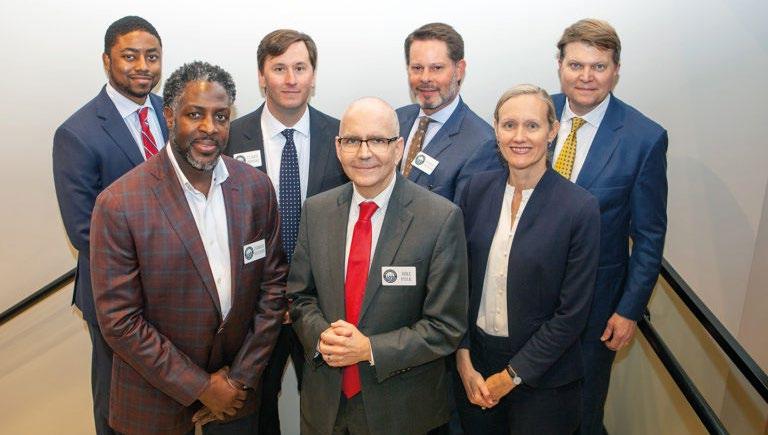
Staff Report
The Richland County Bar Association has announced its new leadership for 2023 following formal confirmation at the association’s December 2022 meeting.
e Richland County Bar Association is one of the largest county bars in South Carolina, serving nearly 2,000 attorneys living and working in Richland County. S. Harrison Saunders VI, Law O ce of S. Harrison Saunders VI LLC, will serve as the bar’s president. Joining Saunders as o cers will be Michael J. Polk, Belser & Belser PA, as president-elect; and
oopers and regional audit rms in the Philadelphia area. Guy has worked with clients in the insurance industry, largely captives, property and casualty, and reinsurance. In addition, he has the Associate in Captive Insurance designation through the International Center for Captive Insurance Education.
Safe Federal Credit Union promoted Wayne Keels to vice president of continuous improvement and project management; he had been assistant vice president of continuous improvement and project management. Keels’ career in project management began more than 20 years ago and includes positions at Motorola, Allstate and Discover Financial Services. He joined Safe in 2018 as director of continuous improvement. Keels has a master of science in computer science from Purdue University and a MBA in marketing and project manage-
Lamar J. Fyall, Assistant U.S. Attorney for the District of South Carolina, as treasurer.
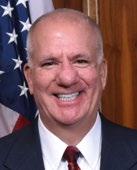

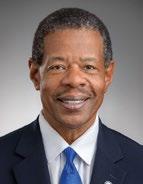
Returning members of the Richland County Bar Association Executive Committee are Derrick L. Williams, Williams & Roche LLC; Shannon Furr Bobertz, S.C. Department of Natural Resources; and the immediate past president, Walter H. Cartin, Parker Poe Adams & Bernstein LLP, who was honored for his outstanding board service in 2022. Claude T. Prevost III, Collins & Lacy PC, was elected as the newest member of the executive committee at the annual meeting.
ment from DeVry University.
Nick Wodogaza is retiring as president and CEO of Palmetto Citizens Federal Credit Union a er 28 years. He will be succeeded by Robert F. Dozier Jr.

GOVERNMENT SERVICES
Furman University’s Riley Institute named omas Alexander, R-Oconee/ Pickens and South Carolina Senate president, as recipient of the 2023 Riley-Wilkins OneSouthCarolina Legislative Leadership Award. Community-health leader Roland
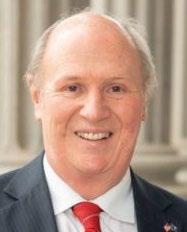

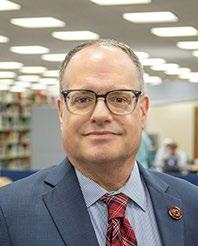

was elected san support. across the equitable funds, and band internet areas in South access to of the Lowcountry during his per-Hampton vices. Under tion grew multimillion-dollar three counties patients. LAW Columbia been named Carolina chief counsel
 The 2023 Richland County Bar Association Executive Committee includes, front row, Derrick Williams, Mike Polk and Shannon Bobertz, along with, back row, Lamar Fyall, Claude Prevost, Harrison Saunders and Walt Cartin. (Photo/Provided)
Bickley
Golson
The 2023 Richland County Bar Association Executive Committee includes, front row, Derrick Williams, Mike Polk and Shannon Bobertz, along with, back row, Lamar Fyall, Claude Prevost, Harrison Saunders and Walt Cartin. (Photo/Provided)
Bickley
Golson
Partin
Dumas
Banush
Rhames
Guy
Keels
Wodogaza
See PEOPLE IN THE NEWS, Page 21
Alexander
Experience Columbia SC names 2023 ambassadors
By Christina Lee Knauss cknauss@scbiznews.com
Experience Columbia SC, the region’s destination marketing organization, announced its new group of 2023 ambassadors on Jan. 11 in conjunction with the launch of this year’s Columbia SC Insider Guide publication, featuring an illustration of Soda City Market created by local artist Cait Maloney.
The ambassador program, now in its
fifth year, allows prospective visitors to see the region through the eyes of its locals, according to a news release.
The new ambassadors are Mattison Heatherly, Bianca Crawford Shelton, John Sherrer and Morihiko Nakahara. Heatherly is founder of City Social Co., a social media and public relations agency specializing in hospitality and lifestyle brands. Shelton is president and CEO of local strategic communications firm The Crawford Austin Agency, as well as a host for the annual Diner
en Blanc event. Sherrer is the director of preservation at Historic Columbia. Nakahara is the music director for the South Carolina Philharmonic.
“Today’s savvy traveler is interested in unique local experiences,” said Kelly Barbrey, vice president of marketing and communications for Experience Columbia SC. “Our ambassador program provides potential visitors the opportunity to see how locals enjoy the Columbia area and shows them how to create those experiences during their
trip. Our 2023 ambassadors have a diverse array of interests and ways they enjoy Columbia that we hope will resonate with our future visitors.”
Past ambassadors include Shanika Pichey, Anthony Goldman, Lynn Luc, Vanessa Bialobreski, Kim Jamieson Crafton, Mark Rapp, Rita Patel, Milo Putnam, Merrell Johnson, Ashley Jenkins Wood, Lee Snelgrove, CJ Lake Tamasco, Ashley Cady Elsey, Angela Yong, Preach Jacobs and Michael Mayo.
Influential Lowcountry politician Arthur Ravenel dies
Contributing Writer
Arthur Ravenel, the former congressman and state lawmaker who helped build the Republican Party in South Carolina and get money for the graceful bridge that dominates the Charleston skyline and bears his name, has died. He was 95.
His family announced in a short statement that he died Jan. 16. e statement did not give a cause.
Ravenel spent six decades in public service, elected to the state Senate, the state House and Congress. He also ran for governor and, late in life a er retiring from the Senate, returned to public service as a member of the Charleston
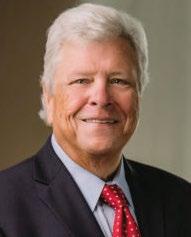
County School Board.
e $632 million bridge over the Cooper River connecting Charleston to Mount Pleasant is named in his honor, a thank you for the years he spent in Washington trying to get money for an iconic span that would t the charming city where he spent most of his life.
Known to political friends and foes alike as Cousin Arthur, Ravenel’s ancestors fought for the Confederacy, and during the heated debate over removing the Confederate ag from the Statehouse dome in 2000, he once referred to the NAACP as the “National Association for Retarded People,” bringing calls for his resignation.
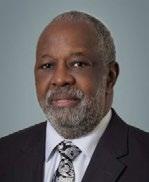
He later voted to remove the ag from the dome and place a similar one at the Confederate Soldier Monument on Statehouse grounds. Ravenel defended his actions by saying he didn’t have a racist bone in his body, and African American colleagues said he was willing at times to help get their bills passed.
Ravenel recalled in a 2004 interview with e Associated Press that he was rst elected to the House in 1952 as a Democrat when there were virtually no Republicans in the state.
“You just heard about Republicans,” he quipped. “Sherman was one.”
Ten years later, Ravenel got involved in the state’s edgling Republican Party
and was a national convention delegate in 1964 when Barry Goldwater was nominated for president.
Ravenel was elected to the state Senate as a Republican in 1980.
“ e Democratic Party was getting more and more liberal,” Ravenel recalled. “As it got more liberal, we were able to recruit more and more people to run.”
In 1986, Ravenel was elected to Congress from the coastal 1st Congressional District. He le eight years later to run for governor, but lost a runo to David Beasley.
— Bruce Smith, Associated Press
Gardner of Beaufort received the 2023 Riley-Wilkins OneSouthCarolina Civic Leadership Award. Alexander has served at the Statehouse since 1987, rst as a representative and then as a senator; in 2021 he was elected Senate president with bipartisan support. He has led e orts and worked across the aisle on workforce development, equitable distribution of pandemic relief funds, and the vital expansion of broadband internet into rural and underserved areas in South Carolina. Gardner increased access to quality health care for residents of the Lowcountry and South Carolina during his 41 years as CEO of Beaufort-Jasper-Hampton Comprehensive Health Services. Under his leadership, the organization grew from a startup nonpro t into a multimillion-dollar corporation that spans three counties and serves more than 17,000 patients.
LAW
Columbia attorney Emma T. Dean has been named executive director of the South Carolina Bar. She most recently served as chief counsel for the South Carolina House
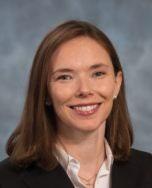
of Representatives Judiciary Committee. Previously, she was in private practice in the appellate and civil defense areas at Nelson Mullins in Columbia and served as a law clerk to John Kittredge of the South Carolina Supreme Court. A graduate of the University of South Carolina School of Law, Dean received a Bachelor of Arts in Economics and Politics from Washington and Lee University. She is a member of the South Carolina Women Lawyer’s Association and the Richland County Bar Association.
Michael Parks is now with the Samuels Reynolds Law Firm. Parks, who received his bachelor’s degree in nance, insurance and risk management from the University of South Carolina Darla Moore School of Business, earned his law degree from the university’s School of Law. He is licensed to practice in all courts in South Carolina, the United States District Court for South Carolina, and the Fourth Circuit Court of Appeals. Before law school, Parks served as special assistant to Gov. Henry McMaster.
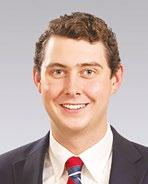
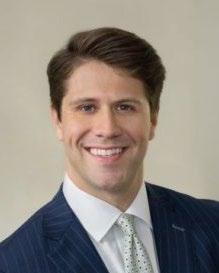
While in law school, he served as president of the student bar association, competed on the school’s mock trial team, was a member of the John Belton O’Neall Inn of Court, and was awarded the John R. Holland Scholarship for his leadership and commitment to extracurricular activities. Parks also served as a law clerk in the governor’s o ce and the White House Counsel’s O ce and as an intern for Dennis W. Shedd on the Fourth Circuit Court of Appeals.
e Richland County Bar presented its Honorable Matthew J. Perry Civility Award to Bobby Stepp, a member of Robinson Gray law rm. Another Robinson Gray member, Becky La tte, received the award in 2010.
NONPROFIT
es and organizations but also helps lead the sustainable-development-goals pilot study launched by Sustain SC and Ernst & Young. She is a political science professor at Coastal Carolina University as well as the HTC Honors College distinguished faculty fellow, developing a new sustainability and coastal resilience major. Martin also sits on the president’s council for sustainability and coastal resilience. In addition, she is executive director for the United Nations Regional Centre of Expertise on Education for Sustainable Development, which adapts sustainable development goals for South Carolina.
REAL ESTATE
Pam Martin has joined Sustain SC as a fellow, a role created for her. As fellow, Martin not only directs collaborative e orts around sustainable development goals for business-
Colliers South Carolina has brought in Rox Pollard III as a brokerage associate on the Colliers Retail Services Team. In his role, Pollard works with tenants, landlords, sellers and purchasers to lease, purchase and sell retail properties and also focuses on increasing the Colliers retail leasing and management portfolio. He graduated from Clemson University with a Bachelor of Science in Economics and a minor in nancial management.

www.columbiabusinessreport.com 21 January 2023 IN FOCUS: WORKFORCE/STAFFING
Gardner
Dean Parks
Stepp
Martin
Pollard
PEOPLE IN THE NEWS, from Page 20
Midlands leaders pay tribute to
visionary Taylor
By Christina Lee Knauss cknauss@scbiznews.com
Business and community leaders in South Carolina are mourning the recent loss of Columbia City Councilman and former state Secretary of Commerce Joe E. Taylor, considered a leader and visionary for his work both in the Columbia area and statewide.
Taylor, 64, died unexpectedly on Dec. 29. His funeral service was held Thursday, Jan. 5, at First Presbyterian Church in downtown Columbia. So large was his impact statewide that flags at the S.C. State House flew at half-staff in Taylor’s honor on Thursday at the request of Gov. Henry McMaster.
A native of Columbia, Taylor has received accolades for his role in the state’s economic growth. During his tenure as commerce secretary under Gov. Mark Sanford, he was credited with leading the team that spearheaded efforts to attract Boeing to North Charleston in 2009.
Taylor was elected to represent District 4 on the council in 2021 to take over a seat formerly occupied by Mayor Daniel Rickenmann. In his role as councilman, Taylor quickly became known as a fierce advocate for businesses and city residents, working both to make it easier for businesses to flourish and to reduce crime and other problems.
He was chairman of the economic and community development committee and also served on the public safety and administrative policy committees.
In a statement, Rickenmann mourned the loss of the man he called a friend as well as a colleague.
“Columbia has lost one of her biggest advocates, one of my best friends,” Rickenmann said. “Joe was a giant in our community. I can think of no person who cared more about Columbia, the Midlands or South Carolina than Joe. He led with his heart and passion to help others.”
Taylor’s fellow council members also released a statement addressing his impact on the business community.
“During his tenure on council, Councilman Taylor was an advocate for business development, particularly as it related to small business owners, and a champion of commerce,” the statement said. “He truly believed in the greatness of our city, and he was
focused on making Columbia better for all citizens.”
Carl Blackstone, president and CEO of the Columbia Chamber of Commerce, said Taylor cared deeply about improving life in general in the city he called home.
“His impact will be felt in Columbia for decades to come,” Blackstone said in a statement.
A keen instinct for business came early for Taylor. While still a student at Wofford College in Spartanburg, he founded Southland Log Homes with his late father and later became the company’s president and CEO. Southland went on to become the largest producer of pre-cut log buildings in North America. He sold the company in 2005.
His years in state leadership started in 2003 when Sanford appointed him chairman of the S.C. Jobs Economic Development Authority. He served as secretary of commerce from 2006 until 2011.
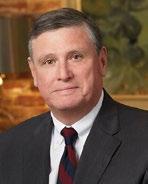
After leaving state government, Taylor worked primarily in real estate development and private equity, among many other ventures.
Taylor made an impact across the river in West Columbia as well, starting in 2014 when he founded his private equity venture, Southland Capital Partners, with offices on State Street.
In an interview with SC Biz News, West Columbia Mayor Tem Miles said Taylor’s selection of State Street as home for his offices helped to jumpstart the commercial and residential redevelopment of the entire Meeting Street area. He also credits Taylor with helping the city redo its zoning codes to bring in further development, including the St. Anns Alley residential community.
“He was very passionate about what West Columbia could be and was willing to put his time and efforts into trying to get it there,” Miles told SC Biz News. “Joe had an unusual combination of vision and follow through. He had both vision and the backbone to follow through, to get out and make things happen. He was an incredible man personally. He was very giving with his resources and most importantly with his time and mentorship for the folks coming up behind him. Our region has lost an incredible leader.”
In 2021, SC Biz News honored Taylor as one of the Midlands’ business Icons at the annual Icons and Phenoms awards event.
Taylor is survived by his wife, Amanda Taylor, a son and a daughter.
22 www.columbiabusinessreport.com January 2023 IN FOCUS: WORKFORCE/STAFFING
business
FEBRUARY 13 HOSPITALITY/TOURISM List: Hotels, Event Spaces Advertising Deadline: January 30 MARCH 20 ARCHITECTURE/ENGINEERING/ CONSTRUCTION List: General Contractors, Engineering Firms Advertising Deadline: March 6 APRIL 10 INFORMATION TECHNOLOGY List: IT Services, Security Firms Advertising Deadline: March 27 MAY 15 HEALTH CARE/LIFE SCIENCES List: Hospitals, Life Science Companies Advertising Deadline: May 1 For advertising information, contact Ryan Downing at rdowning@scbiznews.com Target your market in an upcoming issue of the Columbia Regional Business Report
Taylor
tribute Taylor
Columbia better president and Chamber of cared deeply general in the ColumBlackstone business came student Spartanburg, he Homes with became the CEO. Southlargest buildings in company leadership started appointed him Economic served from 2006 government, real estate equity, across the well, starthis priCapital Street. Biz News, Miles said Street as to jumpresidential Meeting Taylor zoning developAnns Alley about what was willefforts into told SC unusual comthrough. backbone and make incredible very giving impormentorship behind him. incredible honored Taybusiness and Phenhis wife, daughter.
Viewpoint
VIEWS, PERSPECTIVES AND READERS’ LETTERS
Rural South Carolina: Building healthier communities
As we celebrated National Rural Health Day, we were reminded that a strong community is rooted in its people. The Biden-Harris Administration is committed to serving those who live in the rural areas of this country, like the small towns and communities right here in South Carolina. At the United States Department of Agriculture, we are hard at work offering the resources to the rural and agricultural communities that feed and fuel our nation and provide the everyday essentials upon which America depends.
As I’ve traveled across South Carolina, I’ve seen rsthand the unique challenges people in rural communities and remote parts of the state have in accessing the health resources they need and deserve. We at S.C. Rural Development are committed to “going the extra mile” to ensure our programs and the bene ts of our programs are equitable and accessible to all who call rural home.
At USDA Rural Development, we are committed to making sure that people, no matter where they live, have access to high-quality and reliable health care services like urgent care, primary care and dental care. at’s why I’ve been a proud champion of programs like the Emergency Rural Health Care Grants, which was created by President Biden’s historic legislative package, the American Rescue Plan Act.
In the last year, this program has helped rural health care organizations across the state purchase supplies, deliver food assis-
tance, renovate health care facilities and provide people with reliable medical testing and treatment.

Just recently RD has announced four projects that we funded which will help expand access to health care infrastructure and resources via the Emergency Rural Health Care Grants. For example:
Voorhees College received $770,250 in grant funding to make critical renovation upgrades to Voorhees University Health Center. is improvement will allow Voorhees University the needed assistance for food distribution, transportation, and mobile health care to provide expanded opportunities to members of the University community based on CDC guidelines.
rough the Emergency Rural Healthcare Program Voorhees University will better position itself to provide adequate healthcare and expand the scope of its services.
rough the University Health Center, the university provides primary health care services to its students. However, the onset of COVID-19 has caused the unit to extend its reach to the greater community to ensure that residents of Denmark and Bamberg County have free access to COVID testing and vaccinations.
Lee County Council of Aging Inc. received $117,500 in grant funding to purchase vehicles that will assist with food distribution, meal deliveries (approximately 600 meals per week), provide transportation to medical and business appointments for Lee County Council of Aging Inc.’s clients, repaving and expanding a parking lot, and paving a tness track at the facility. Upgrading the vehicles will provide a more economical and practical way of supplying much needed services to the most vulnerable citizens of Lee County. Lee County Council of Aging provides services for
homebound, elderly and disable citizens of Lee County.
e vital Aging of Williamsburg County received a $1 million grant which will be used to construct the Murdaugh Senior Center in Kingstree. e facility is a 14,000 square foot facility which will provide seniors of rural Williamsburg County access to medical care, tele-medicine, food distribution, COVID 19 vaccines and testing, exercise and nutrition, health and wellness instructions as well as daily meals and companionship, and transportation to medical appointments.
e Denmark Technical College received a $975,000 grant which will be used to expand the Denmark Technical College Nursing Program. e project expands the medical care services they provide to the students and community members including COVID vaccination/testing, mental health services, immunizations, health and nutrition services, general medical care, transportation to medical appointments and advanced specialized care.
People in remote parts of the state o en need to travel greater distances to see a health care provider, are less likely to have access to high-speed internet to utilize telehealth services and are more likely to live in an area that has a shortage of doctors, dentists and mental health providers.
rough programs like the Distance Learning and Telemedicine Grants Program, we are making it easier for people living in rural areas to access health care services remotely.
RD is continuing to help expand access to health care infrastructure and resources via the Distance Learning and Telemedicine Grant Program.
Health is about much more than medical care. Access to modern, reliable water
and wastewater infrastructure is a critical necessity for the health and well-being of every American.
In South Carolina, we continue to work hand-in-hand with our partners and local community leaders to promote a healthy community and environment through our Water and Environmental Programs. ese programs help rural communities obtain the technical assistance and capital nancing necessary to develop clean and reliable drinking water and waste disposal systems. Safe drinking water and sanitary waste disposal systems are vital not only to public health, but also to the economic vitality of rural America rough these programs, we make sure people, children and families across the state have clean water and safe sewer systems that prevent pollution and runo .
USDA Rural Development is a partner who invests in keeping rural people healthy. Join us this National Rural Health Day, ursday, Nov. 17 as we celebrate the power of rural.
You can learn more about our programs by visiting our website, www. rd.usda.gov and clicking on “programs and services,” or by calling 803-765-5163.
Saundra Glover is the state director of USDA Rural Development in South Carolina.

January 2023
ṢAUNDRA GLOVER
We want to hear from you
Ross Norton, Editor SC Biz News 35B Cessna Court Greenville, S.C. 29607
Write:
Email: rnorton@scbiznews.com
Your workforce is your greatest asset

Our team includes:

• Physicians.
• Nurse practitioners.
• Registered nurses.
• Certified health educators.
• Medical assistants.
• Certified occupational health nurse practitioners.
• Occupational medicine physicians.
• Athletic trainers.
To learn more, call 833-890-2109.
Some benefits of working with Employer Health Services include:
• Continuity of care for injury treatment.
• Board-certified occupational health physician oversight and support.
• Primary care services on-site

• E xperienced backup medical coverage.
• Competitive pricing and easy scheduling.
Employer Health Services provides occupational medicine and episodic care services on-site. Our team members are available to come to your worksite and provide services to your employees for a few hours at a time, part-time or full-time.
23-0021

































































 By Christina Lee Knauss cknauss@scbiznews.com
By Christina Lee Knauss cknauss@scbiznews.com












 By Stephen Slifer Contributing Writer
By Stephen Slifer Contributing Writer






















































 The state ports have experienced continual growth over the last few years, operating with a mix of union and nonunion employees. (Photo/Kim McManus)
The state ports have experienced continual growth over the last few years, operating with a mix of union and nonunion employees. (Photo/Kim McManus)






























 The 2023 Richland County Bar Association Executive Committee includes, front row, Derrick Williams, Mike Polk and Shannon Bobertz, along with, back row, Lamar Fyall, Claude Prevost, Harrison Saunders and Walt Cartin. (Photo/Provided)
Bickley
Golson
The 2023 Richland County Bar Association Executive Committee includes, front row, Derrick Williams, Mike Polk and Shannon Bobertz, along with, back row, Lamar Fyall, Claude Prevost, Harrison Saunders and Walt Cartin. (Photo/Provided)
Bickley
Golson










